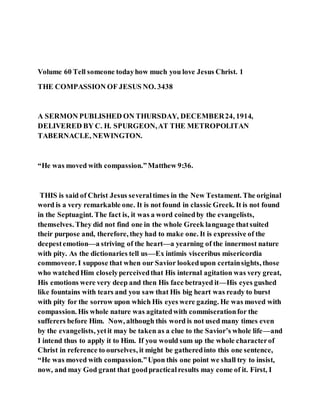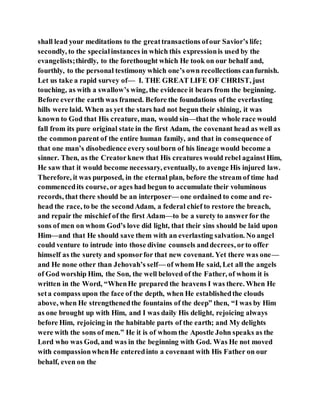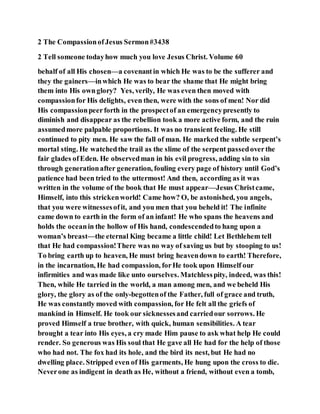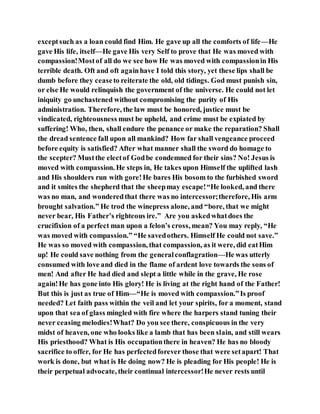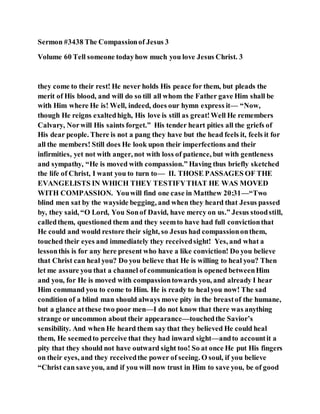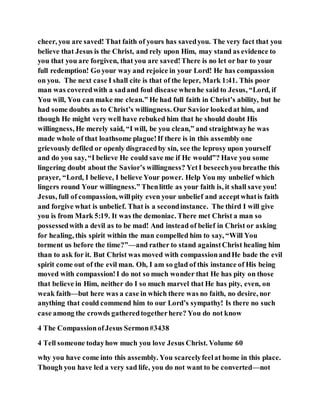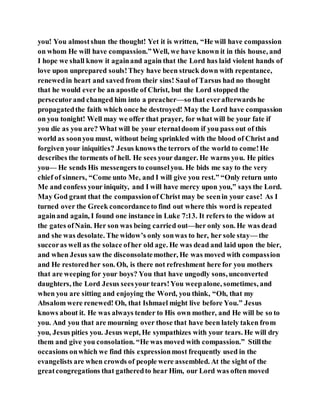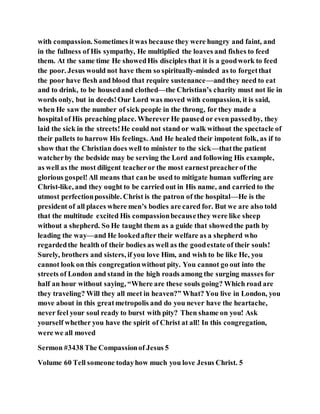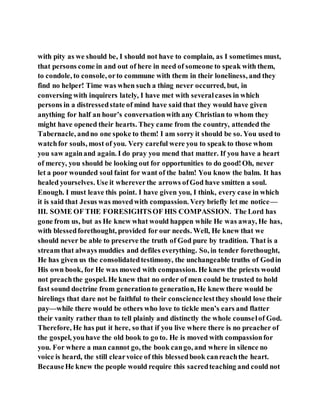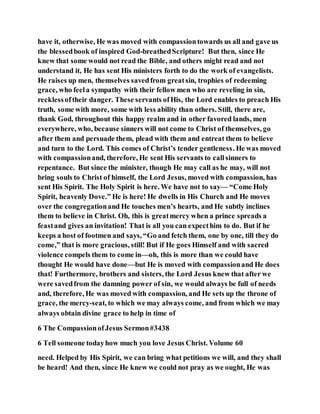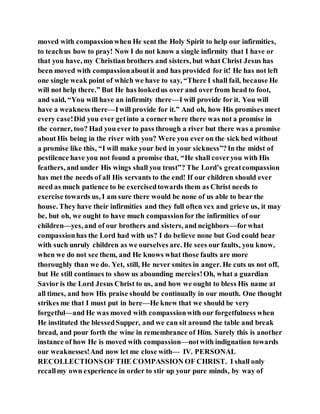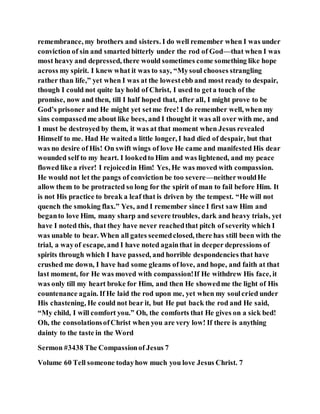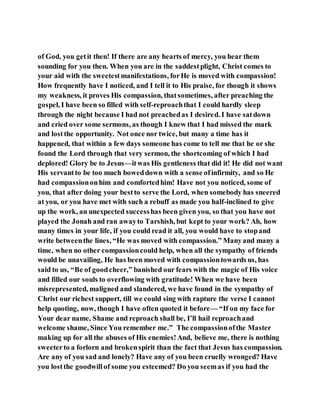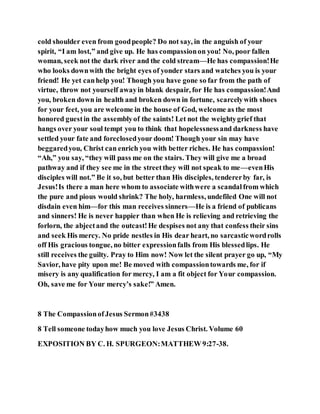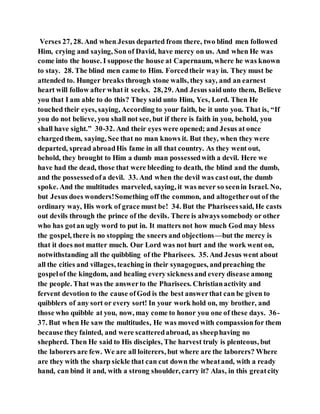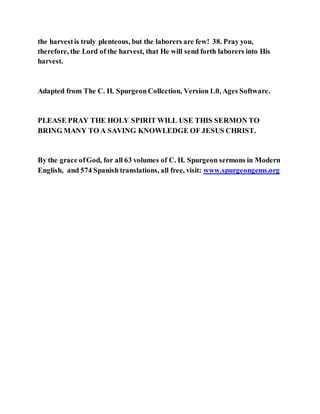The document recounts the story of Jesus healing two blind men who called out to him for mercy, demonstrating his compassion and willingness to help those in need. After Jesus touched their eyes, they received their sight and followed him, symbolizing both their physical and spiritual awakening. Various biblical commentaries are referenced to provide insights on faith, prayer, and the nature of divine mercy in this miraculous event.
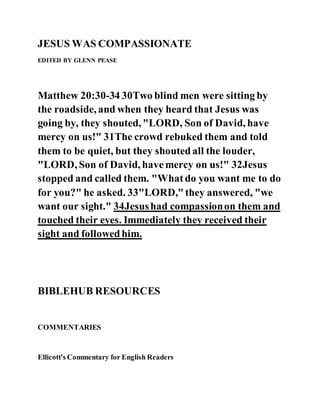
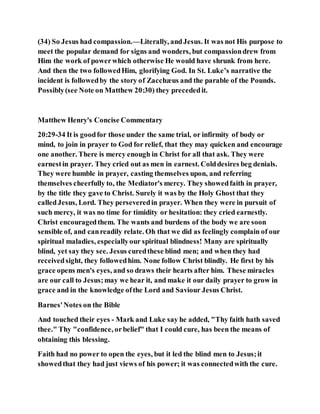
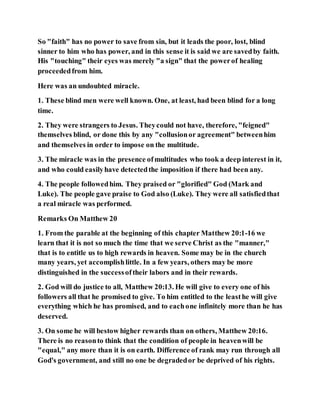
![4. God does as he pleases with his own, Matthew 20:15. It is his right to do so -
a right which people claim, and which God may claim. If he does injustice to
no one, he has a right to bestow what favors on others he pleases. In doing
goodto another man he does no injury to me. He violated none of my rights
by bestowing greattalents on Newtonor greatwealth on Solomon. He did not
injure me by making Paul a man of distinguished talents and piety, or John a
man of much meekness and love. What he gives me I should be thankful for
and improve; nor should I be envious or malignant that he has given to others
more than he has to me. Nay, I should rejoice that he has bestowed such
favors on undeserving people at all; that the race is in possessionofsuch
talents and rewards, to whosoevergiven;and should believe that in the hands
of God such favors will be wellbestowed. Godis a sovereign, andthe Judge of
all the earth will do that which is right.
5. It is our duty to go into the vineyard and labor faithfully when ever the
Lord Jesus calls us, and until he calls us to receive our reward, Matthew 20:1-
16. He has a right to call us, and there are none who are not invited to labor
for Him.
6. Rewards are offeredto all who will serve him, Matthew 20:4. It is not that
we deserve any favor, or that we shall not say at the end of life that we have
been "unprofitable" servants, but He graciouslypromises that our rewards
shall be measured by our faithfulness in His cause. He will have the glory of
bringing us into His kingdom and saving us, while He will bestow rewards on
us according as we have been faithful in His service.
continued...
Jamieson-Fausset-BrownBible Commentary
Mt 20:29-34. Two Blind Men Healed. ( = Mr 10:46-52;Lu 18:35-43).
For the exposition, see on[1332]Lu 18:35-43.
Matthew Poole's Commentary
Ver. 29-34. Mark repeateththe same story, Mark 10:46-52, with severalmore
circumstances.](https://image.slidesharecdn.com/jesuswascompassionate-191122002115/85/Jesus-was-compassionate-4-320.jpg)
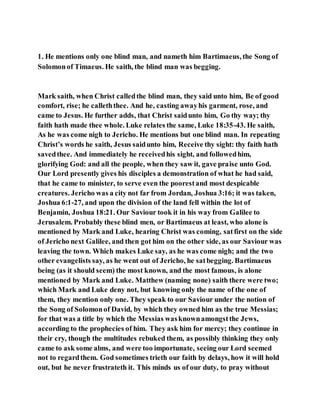
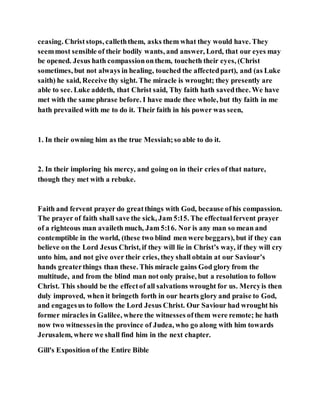
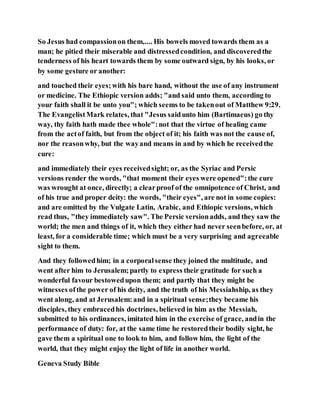
![So Jesus had compassionon them, and touched their eyes:and immediately
their eyes receivedsight, and they followedhim.
EXEGETICAL(ORIGINAL LANGUAGES)
Expositor's Greek Testament
Matthew 20:34. σπλαγχνισθεὶς. Note the frequent reference to Christ’s pity in
this gospel(Matthew 9:36, Matthew 14:14, Matthew 15:32, and here).—τῶν
ὀμμάτων, a synonym for ὀφθαλμῶν, as if with some regard to style which the
scribes might have been expectedto appreciate, but have not (ὀφθ., thrice,
T.R.). ὄμμα is poetic in class. Greek.—ἠκολούθησαν, they followedHim, like
the rest, without guide (sine hodego, Beng.), so showing at once that their eyes
were opened and their hearts grateful.
Cambridge Bible for Schools andColleges
34. they followedhim] It is probable that very many of those who had received
sight and soundness of limb by the word or touch of Jesus followedHim to
Jerusalem.
followed]Jesus Himself leads the procession. SeeLuke 19:28.
Bengel's Gnomen
Matthew 20:34. Σπλαγχνισθεὶς, being moved with compassion)The
compassionofJesus was arousedby every human misery.—ἠκολούθησαν
Αὐτῷ, they followedHim) with the multitudes mentioned in ch. Matthew 21:8,
and without any one to lead them.[898]
[898]Sc. as formerly, when they were blind.—ED.
Pulpit Commentary
Verse 34. - Touchedtheir eyes. Only St. Matthew mentions this action of our
Lord; but in all other casesofthe cure of blindness the healing touch of the
Man accompaniedthe word of the God (comp. Matthew 9:29; Mark 8:23;](https://image.slidesharecdn.com/jesuswascompassionate-191122002115/85/Jesus-was-compassionate-8-320.jpg)
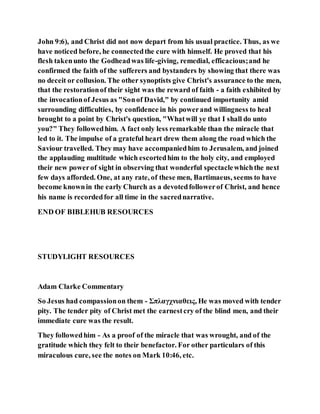
![Reader, whosoeverthou art, act in behalf of thy soul as these blind men did in
behalf of their sight, and thy salvationis sure. Apply to the Son of David; lose
not a moment; he is passing by, and thou art passing into eternity, and
probably wilt never have a more favorable opportunity than the present. The
Lord increase thy earnestnessandfaith!
Coffman's Commentaries on the Bible
And Jesus, being moved with compassion, touchedtheir eyes;and straightway
they receivedtheir sight, and followed him.
Christ's wonderful compassionsethim apart from others. Alas, compassionis
not a common human trait. How few there are who have the grace to see and
the compassionto pity the sufferings of others. It is far easierto ascribe their
woeful condition to their own sins or misdeeds and to go blindly and
heedlesslyonwardwithout regard to those of our fellow mortals who make up
the company of earth's wretchedsufferers. How glorious it is that Jesus saw
the man, and all the human tragedy, and the bleeding human heart that beat
beneath the beggar's tatteredshirt. H. Leo Boles observedfrom Mark's
accountthat Jesus bade them, "Go thy way." And yet, with an affectionate
disobedience, they followedhim as their benefactor.
It was their way to follow him, since they were obedient after all. The blessing
which they sought in receiving sight may have led them to become his disciples
and receive spiritual blessings.[4]
ENDNOTE:
[4] H. Leo Boles, A Commentary on the Gospelaccording to Matthew
(Nashville: The GospelAdvocate Company, 1961), p. 408.
John Gill's Exposition of the Whole Bible](https://image.slidesharecdn.com/jesuswascompassionate-191122002115/85/Jesus-was-compassionate-10-320.jpg)
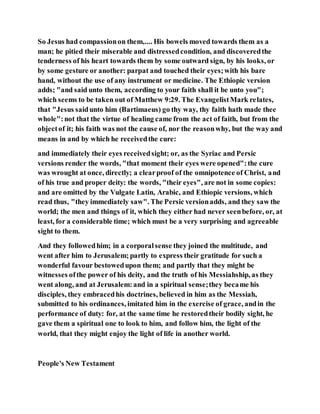
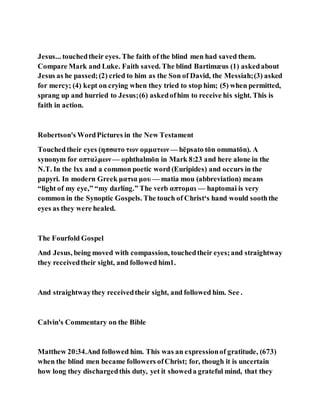
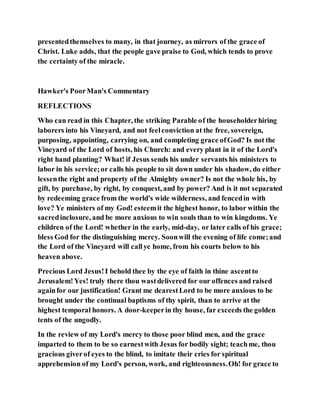
![see the king in his beauty, and to have my soul so awakenedto desires after
Christ, that I may follow my God and Saviorby faith here, till in open vision I
shall see him as he is, and dwell with him forever!
John Trapp Complete Commentary
34 So Jesus had compassiononthem, and touched their eyes:and immediately
their eyes receivedsight, and they followedhim.
Ver. 34. And Jesus had compassionon them] He made their case his own.
Misericordia Mercysounds as much as misery laid to heart. Christ’s heart
sounded upon the sight and suit of these blind beggars, Isaiah63:15, and this
was beyond all alms, should he have done no more for them. Forwhen one
gives an alms, he gives somewhatwithout himself, but by compassionwe
relieve anotherby somewhatwithin and from ourselves, while we draw out
our soul (not our sheafonly) to the hungry, Isaiah58:10.
And immediately their eyes receivedsight] This is not every blind man’s
happiness, that yet prays for sight. But there is a better eyesightthan that of
the body, which if God vouchsafe to any in bodily blindness (as he did to that
blind boy of Gloucesterthat had suffered imprisonment there for confessing
the truth) it may be said to such surely, as BishopHooper the martyr did to
him, Ah, poor boy, God hath takenfrom thee thy outward sight, but hath
given thee another much more precious, &c. (Acts and Mon.) The like favour
God showedto Didimus Alexandrinus, who though blind from his childhood,
yet was not only an excellentartist, but an able divine; and wrote certain
commentaries on the Psalms, and likewise onthe Gospels;being now (saith
Jerome, who relates it) above 83 years of age. Trithemius and Bozius report
the like things concerning one Nicasius de Voarda, a Dutchman, who being
struck blind at three years old, became nevertheless anexcellentscholar, and](https://image.slidesharecdn.com/jesuswascompassionate-191122002115/85/Jesus-was-compassionate-14-320.jpg)
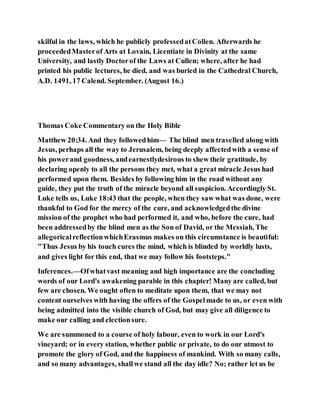
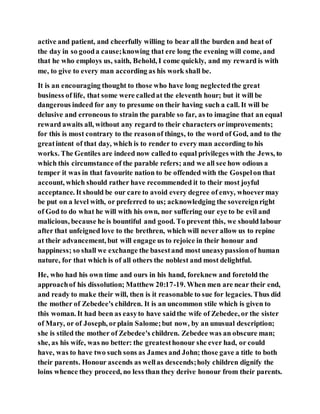
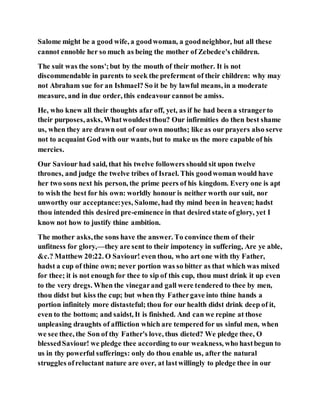
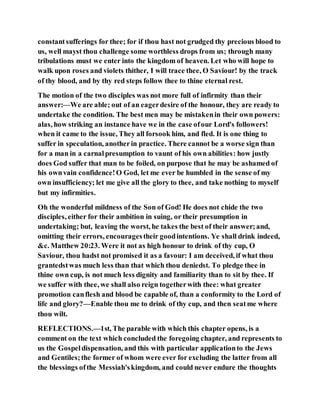
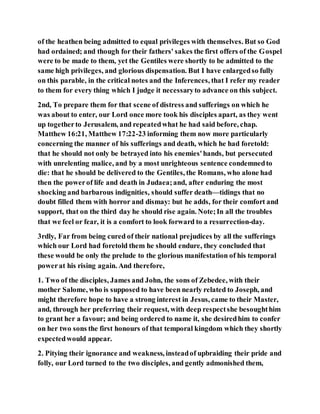
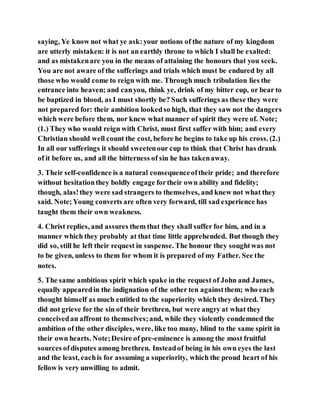
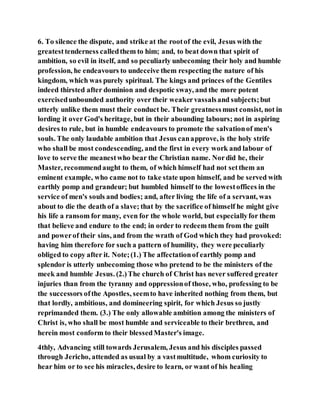
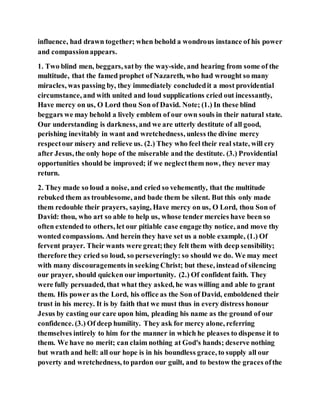
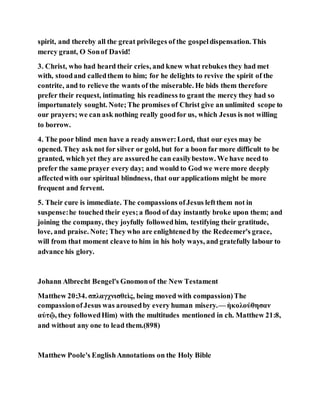
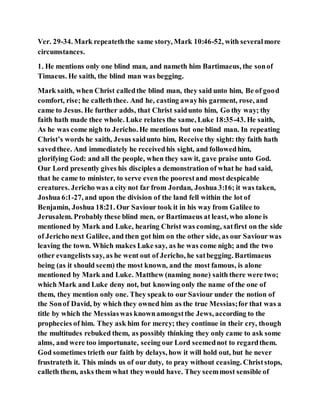
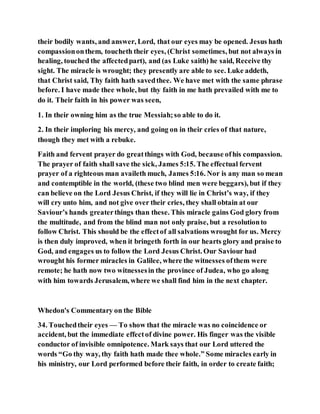
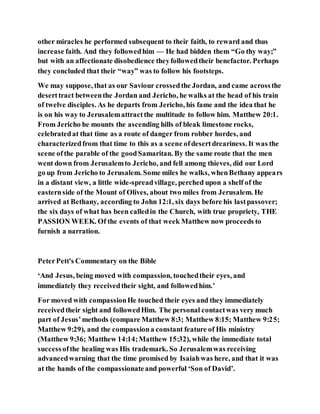
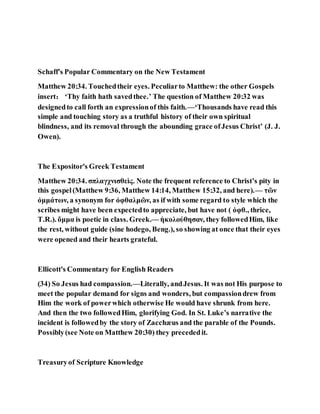
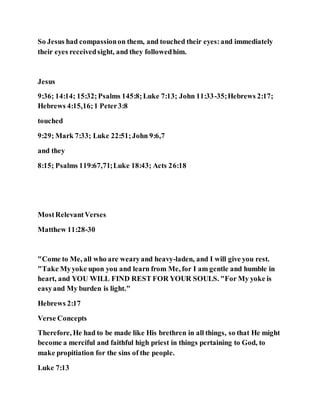
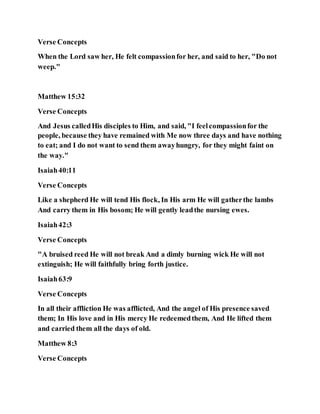
![Jesus stretchedout His hand and touched him, saying, "I am willing; be
cleansed."And immediately his leprosy was cleansed.
Matthew 8:16-17
When evening came, they brought to Him many who were demon-possessed;
and He castout the spirits with a word, and healed all who were ill. This was
to fulfill what was spokenthrough Isaiah the prophet: "HE HIMSELF TOOK
OUR INFIRMITIES AND CARRIED AWAY OUR DISEASES."
Matthew 9:36
Verse Concepts
Seeing the people, He felt compassionfor them, because they were distressed
and dispirited like sheepwithout a shepherd.
Matthew 14:14
Verse Concepts
When He went ashore, He saw a large crowd, and felt compassionfor them
and healedtheir sick.
Matthew 18:11-13
["Forthe Son of Man has come to save that which was lost.]"What do you
think? If any man has a hundred sheep, and one of them has gone astray, does
he not leave the ninety-nine on the mountains and go and searchfor the one
that is straying? "If it turns out that he finds it, truly I sayto you, he rejoices
over it more than over the ninety-nine which have not gone astray.
Matthew 20:34
Verse Concepts
Moved with compassion, Jesus touchedtheir eyes;and immediately they
regainedtheir sight and followed Him.](https://image.slidesharecdn.com/jesuswascompassionate-191122002115/85/Jesus-was-compassionate-30-320.jpg)
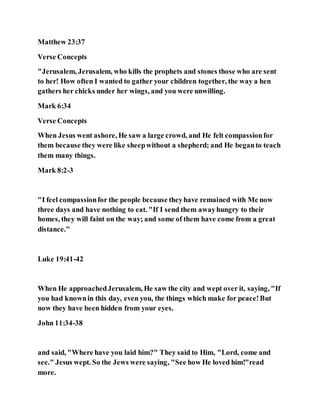
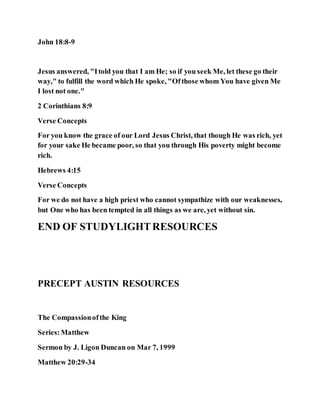
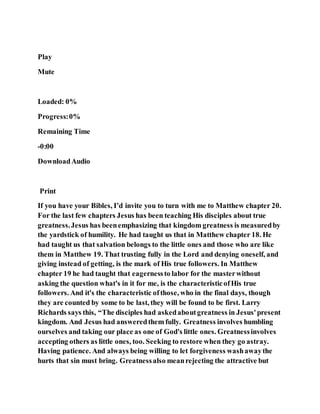
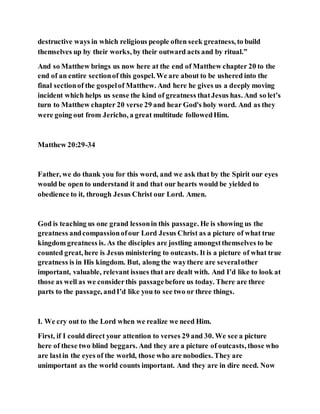
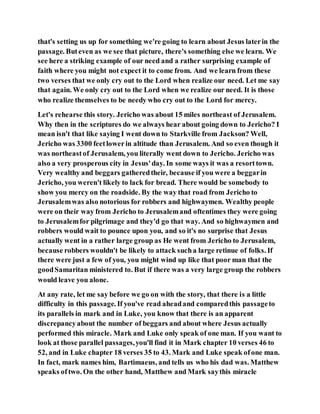
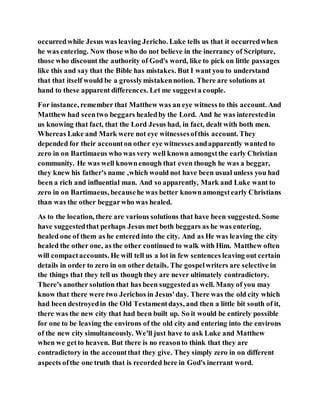
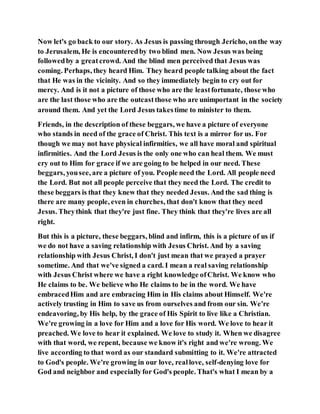
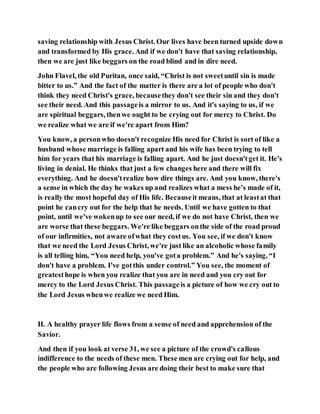
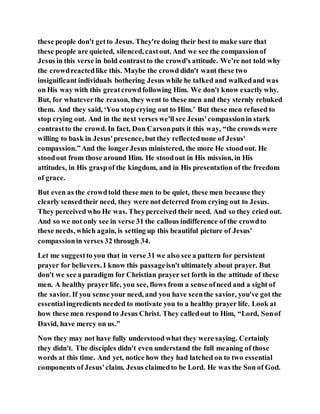
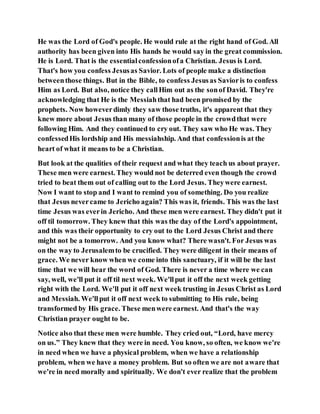
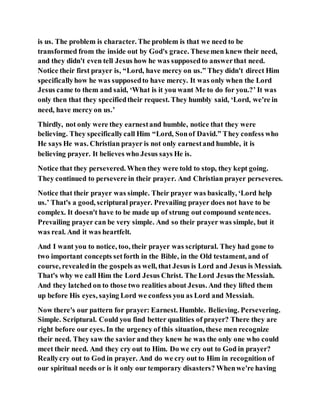
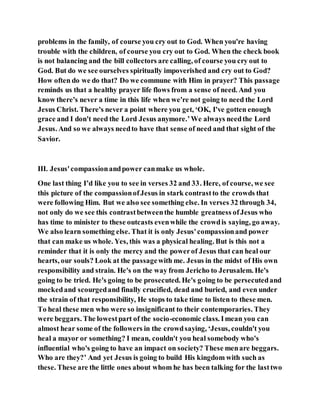
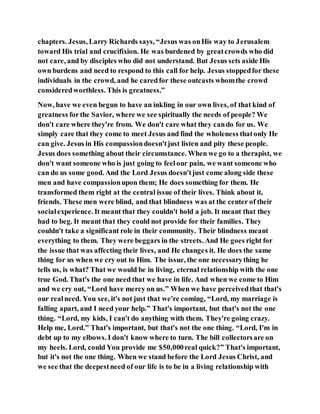
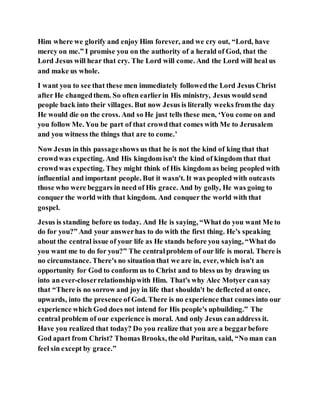
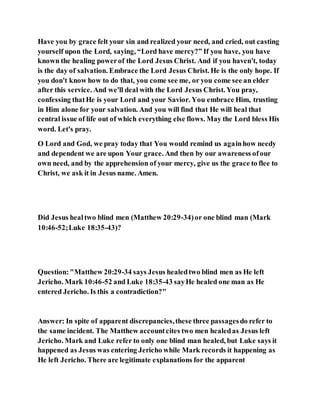
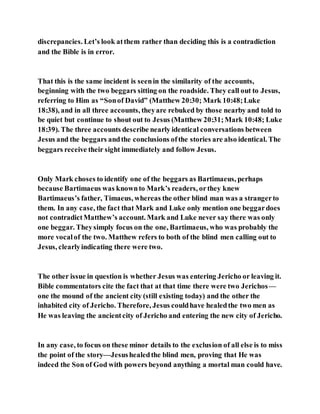
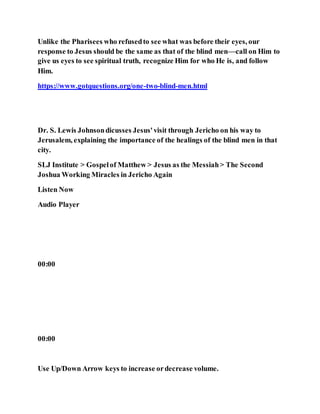
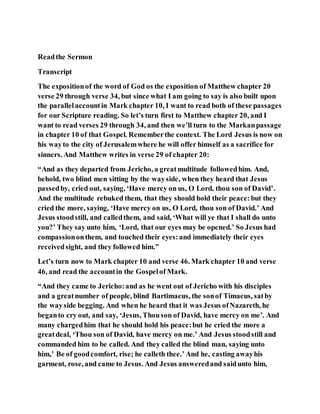
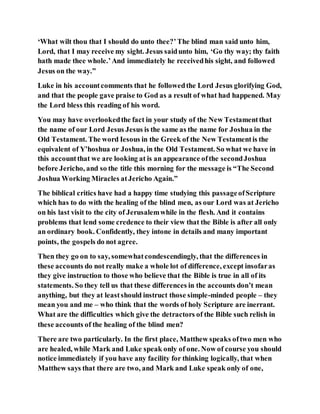
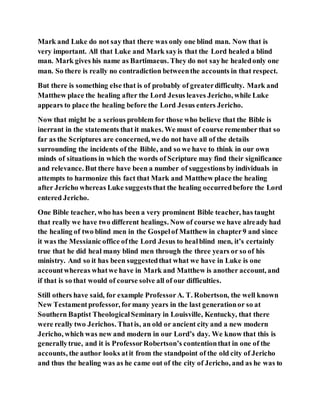
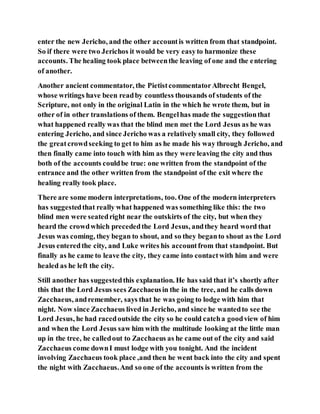
![standpoint of the leaving of the city whereas the other is written from the
standpoint of our Lord entering back into the city, and as he entered, he met
the blind men and healed them.
So there are a number of suggestions thathave been offered. The Gospels do
not really give us anything necessarilycontradictory. We just don’t know the
details. One of the interesting things that we shall be engagedin at leastfor a
little while when we get to heavenis the harmonization of many things with
which we do not have enough information to harmonize ourselves. So I don’t
think that there is any serious problem in this at all. It’s interesting. I don’t
know how it happened, and I’m looking forward to finding out how when I
get there. But I imagine that when we get there these will be rather
insignificant things. And you’ll probably say to me, Dr. Johnson, why did you
waisteight or nine minutes that morning talking about that? [Laughter]
There is a two-fold significance in this event that is more important, and I
think the first thing is what we cancall, for the sake ofa better word, a
dispensationalsignificance. Rememberthe Lord Jesus is coming to Jerusalem
as the King of Israel. When he enters—shortlyin the next messagewe shall
considerhis untriumphal entry—he will come and the people shall shout out,
“Blessedis the King who comes in the name of the Lord.” And I think since it
was one of the duties of the Messianic king to heal the eyes of the blind,
specifically, that it’s very appropriate that as he makes his plans for entering
the city of Jerusalem, he should heal againsome blind men making or
bringing to the forefront againthe fact that he is the Messianicking who
performs the miracles that he is supposed to perform according to Old
Testamentprophesy. That’s one of the important things.
But there is another thing that is even more important, and that is the
reference that this particular incident has to the spiritual life of men and
women. It is againa beautiful illustration of the Lord’s power to illuminate
the spiritually blind. The word of God tells us the Apostle Paul, particularly,
that the natural man – that is the man who does not have any relationship to
the Lord Jesus that is vital and life-giving – the natural man receives not the
things of the Spirit of God; they are foolishness to him, neither canhe know
them for they are spiritually discerned.](https://image.slidesharecdn.com/jesuswascompassionate-191122002115/85/Jesus-was-compassionate-52-320.jpg)
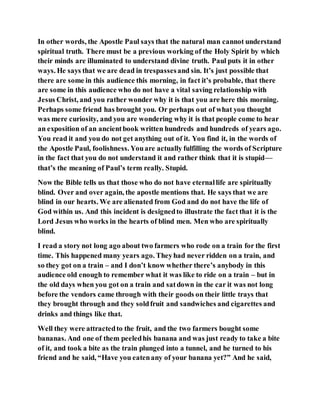
![no, I haven’t. He said, “Welldon’t do it; it’ll make you blind as a bat.”
[Laughter]
Now there are people who sit in an audience such as this who do not
understand anything more about spiritual things than those two farmers
understood about bananas and tunnels. You are here and that’s all, and you
wonder why.
Now I know that’s true, because I attended church myself for about twenty-
five years and did not understand what in the world was going on. I was blind
as a bat spiritually. Now God the Holy Spirit must work in the hearts of men
for spiritual illumination to come, and this incident this miracle in the life of
our Lord is another illustration of his power. Let’s turn to it now, and first of
all, let me say a word about the historicalsituation againstthe background of
which the Lord Jesus ministers.
Now we are in the part of Matthew in which we are going to have a great deal
of stress upon the ministry of the Lord in the last days. To tell you the truth, I
am really excited. I don’t get excited very often. But I am really excitedabout
studying these last chapters of the Gospelof Matthew again, because I think
the most fruitful parts of biblical study are the passages inthe gospels that
have to do with the passionof the Lord Jesus. And we are fastapproaching
that part of the GospelofMatthew in which the Lord Jesus in the last days of
his life ministers there, preparatory to giving his life a ransom for many.
Now as he made his way down to Jerusalemon the last of his journeys to that
city in the flesh, he was making his way with the apostles, andalso with a
company of friends. Mark tells us in the 32nd verse of the 10th chapter, “And
they were on the way going up to Jerusalemand Jesus wentbefore them.”
And you canpicture the little crowdthe apostles gatheredcloseto the Lord
Jesus and then their friends and relatives who were a little back, and the Lord
Jesus suddenly beganto lengthen his steps, as he made his way toward
Jerusalem. Luke describes his countenance as an appearance as if he were
going to Jerusalem. And so as he lengthenedhis step and marched out with
increasing speedbefore them the apostles noticedthat that was not his](https://image.slidesharecdn.com/jesuswascompassionate-191122002115/85/Jesus-was-compassionate-54-320.jpg)
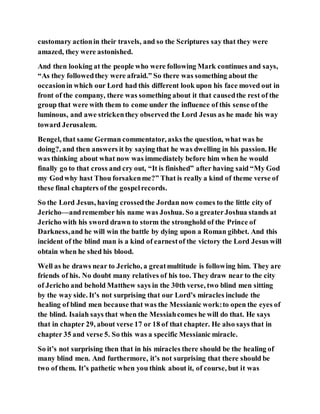
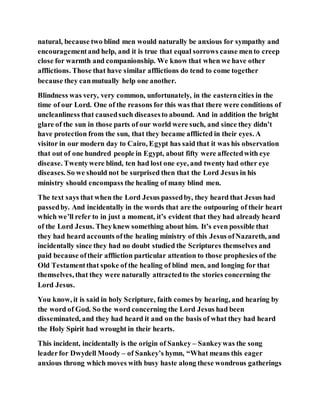
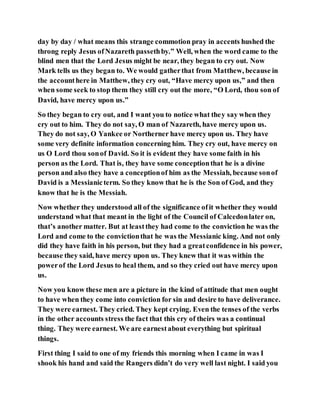
![know you cannot win a baseballgame if you have a hole in your bat.
[Laughter] Now some of you evidently haven’t read the morning paper, and
you do don’t know that the Rangers were nohitted last night. They didn’t get
a hit in the game. And my friend, who is a baseballfan said, that’s true, you
cannot win a baseballgame if you don’t geta hit.
Now we are very earnestabout our sports. We are very earnestabout our
business. We are very earnestabout our studies. We are very earnestabout
our calling in life about our friends our hobbies – about everything – but
when it comes to spiritual things, our hearts are as the old commentators used
to say, as cold as the arctic snows. These menwere earnest. Notonly that they
were persistent. When actually people said, shut up, they saidwe’re gonna not
only keepit up but we’re going to shout loud enough in order to getover the
heads of our hinderers, and so they cried out the text of Scripture says the
more. So the more they were told to shut up the louder they cried. They were
persistent. They knew what they wanted. And this is a very poignant fact
when you think of blind men who could not see in the midst of a multitude.
They must have been crying out all along where is he? Which way did he go?
What street did he turn down? And all at the same time shouting out, O Lord,
thou son of David have mercy upon us! Which way did he go? Lord have
mercy upon us. Did he turn that way? Show me. Take me to him. You can see
this was something that was very very important for them. They knew what
they wanted and incidentally they were humble.
These cries that they were making were confessionsoftheir unworthiness. O
Lord, thou sonof David have mercy upon me. They did not talk of their
merits. They didn’t say, for example, O Lord have mercy upon us, we attend
the synagogue regularly. We listen to the Pharisees.We study the Scriptures.
We do goodworks. We don’t put a sign our face “blind” when we really can
see. Theyhad no talk of merit whatsoever, because wheneverwe talk of merit
before the Lord, the doors of heaven are shut. O Lord, thou sonof David have
mercy upon us. They really were beggar—literally, Mark tells us—and they
were beggars spiritually seeking forhelp. And they plead as criminals, have
mercy upon us.](https://image.slidesharecdn.com/jesuswascompassionate-191122002115/85/Jesus-was-compassionate-58-320.jpg)
![Now this illustrates of course the factthat according to the teaching of the
word of God, our wills are obstinate in rebellion againstthe Lord. You know,
the Scriptures so plainly teach—Ihave to talk about this constantly because I
find that this is one of the most difficult things for men to grasp. This morning
after I left the service at 8:30 and was sitting around a table with some who
had been in the eight-thirty service, this question came up again of the
relationship of the will in our salvation.
The Bible teaches that we have a will, that we do make decisions. But the Bible
teaches that the will is a secondaryagent. The will acts in accordancewith our
nature and our nature affectedby the fall is wickedand rebellious against
God. Therefore, the decisions of the will which are a response to the inmost
disposition of a man are always decisions contraryto the will of God. I’ve said
this over and over again, and I say it again, because there are always some
strangers in the midst. My old Bible teacherusedto saythat we never make a
decisionof the will that is favorable to God unless God has previously “jiggled
our willer.” [Laughter]
Now that is biblical teaching. It’s hard for men to understand that. But
nevertheless it is true. It is basic to the gospelof the Lord Jesus. The responses
that men make do not arise ultimately from the heart of men; ultimately they
arise from God’s working. That’s why salvationis of the Lord. So when we
read these men cry out, have mercy upon us, it’s obvious that God has already
wrought in their will, and they are crying out now in response to what he has
done.
Their wills naturally were obstinate. They were rebellious. Their
understanding was darkened. Their affections were depraved. They were
blind to the things that really counted. That’s the way we are born. We are
born in our sin. You know you can speak to someone about the wonders of
this creationabout us. I know that is difficult in Texas, but nevertheless there
are some things in Texas that are beautiful. I hope to see them some day.
[Laughter] No seriously, now, I’ve lived Texas longerthan any place else;I
considermyself a Texannow, at leastin part.](https://image.slidesharecdn.com/jesuswascompassionate-191122002115/85/Jesus-was-compassionate-59-320.jpg)
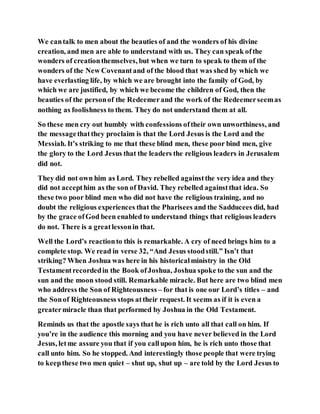
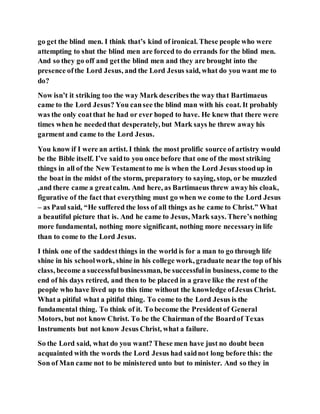
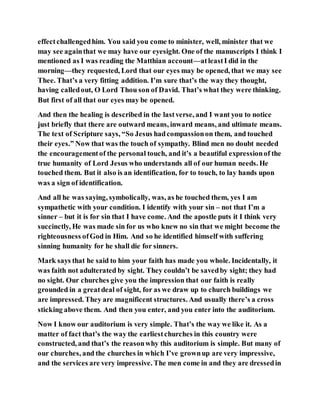
![different kinds of clothes. Theyare either dressedin a robe, or they are
dressedin clericalgarb with the round clericalcollar. That, incidentally, is not
a slipped halo. [Laughter]
And when they stand in the pulpit, they not only stand in the pulpit but they
go through motions that are designedto impress our senses.Theytwist. They
turn. They genuflect. They kneel. They bow. They frequently take things and
do things with them. They stand before the altar, so-called. The whole
impression seems to be, faith does come by sight, to some extent at least. They
impress us.
But the Lord Jesus said, your faith—not your humility, not your persistence,
not your purposefulness—yourfaith has made you whole. God has so worked
that he has given you faith, and that faith is the basis of your salvation. The
ultimate means is his compassion. Jesushad compassiononthem. Paul says he
speaks aboutGod who was rich in mercy for his greatlove wherewith he had
loved us. And so out of compassion, the Lord Jesus respondedto what he had
produced in their hearts and gave them the pronouncement that they were
now whole forgiven men.
And not only that, but their eyes were opened. Men speak ofmerits. Proud
men getdown upon their knees and offer prayers to God, thinking that their
prayers are the means of God’s blessing. But the wind sweeps the prayers
away, for God does not hear that kind of prayer. When the messengerof
mercy the Lord Jesus came to this earth, he did not enter into the Hiltons and
the Sheratons and the Holiday Inns and the Howard JohnsonInns, but he
came to the inn of the broken heart and the contrite spirit, because God
responds to those who acknowledgethat they have nothing with which to
commend themselves to the Lord.
Well the result of the healing is that they followedhim, and Luke tells us that
they glorified God, which led to the praise of the Lord by the people. What a
beautiful thing that is, too. When I was growing up in the Presbyterian
Church, there was put in my hands the shorter catechism, and I was told to
memorize it. Now that is all very vague in my mind because that was back in
the first millennium. [Laughter] There are only little snatches that I](https://image.slidesharecdn.com/jesuswascompassionate-191122002115/85/Jesus-was-compassionate-63-320.jpg)
![remember from that. Since then, of course, I’ve lookedat the confessionand
studied it, and many things have come back but there were severalthings that
persistedthrough my days of spiritual darkness, and one of them was the
purpose for men being here. Man’s chief end is to glorify God and enjoy him
forever. And when the Lord Jesus workedin the hearts of these two blind
men, they were so happy over what God had done to them and they so praised
God that they glorified God. They had reachedthat ultimate goalfor which
we are here in this earth to glorify him.
Now the Lord Jesus has changedhis position. He’s no longer here in our
midst. He’s at the right hand of the majesty on high, but it’s still true, my dear
friends, that Jesus of Nazarethpasses by. He does not do it physically. He does
it through his word and through his spirit. And we have listened as we have
read the word of God to the expositionof the powerJesus Christ to heal. And
if there is someone in our audience this morning who under the influence of
the Holy Spirit, has been brought to the conviction of his sin, he stands ready
and waiting to deliver from the blindness of our heart, to bring you into the
knowledge ofthe Lord Jesus whichmeans everlasting life.
Remembering that in a few moments the Lord Jesus will die upon the cross at
Calvary for sinners, making it possible for all of our sin and guilt and
condemnation to be washedtotally clean. And if Godhas brought in your
heart the desire he brought into the hearts of these blind men for healing, may
God help you deep down within the recessesofyour being to cry out, O Lord
Thou son of David, have mercy upon me. And this greatmiracle of healing
will be accomplishedspiritually again. May God speak to your heart to that
end. Let’s stand for the benediction.
[Prayer] Father, we know that we have only inadequately expressedthe
greatness ofthe healing ministry of the Lord Jesus, but we do know deep
down within us, Lord, what Thou hast done for us and what Thou art able to
do for men who come through the Spirit’s enablement to the Lord Jesus
Christ, the Son of God, the MessiahofIsrael, the Saviorof sinners.
And Lord, if there should be some one present in this auditorium, one little
child, perhaps one young man, one young woman, one elderly man or woman](https://image.slidesharecdn.com/jesuswascompassionate-191122002115/85/Jesus-was-compassionate-64-320.jpg)
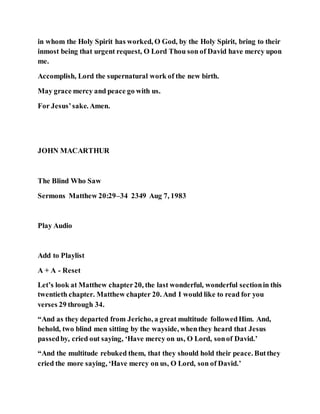
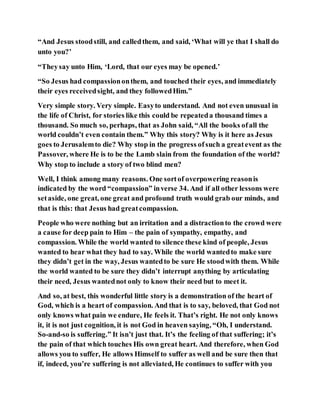
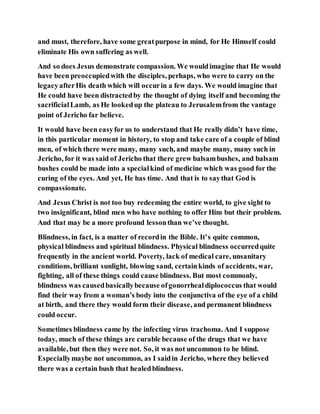
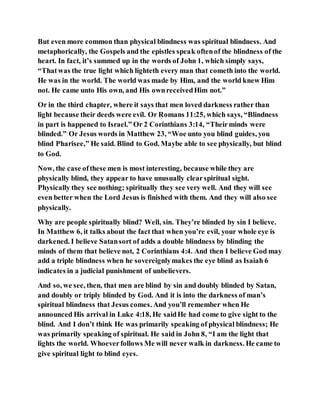
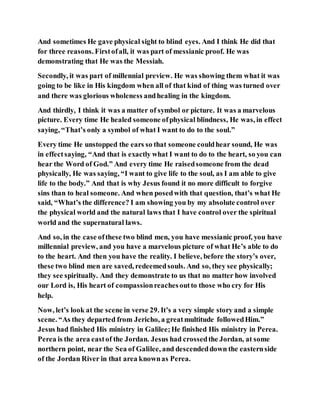
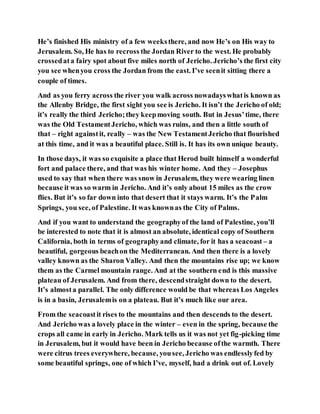
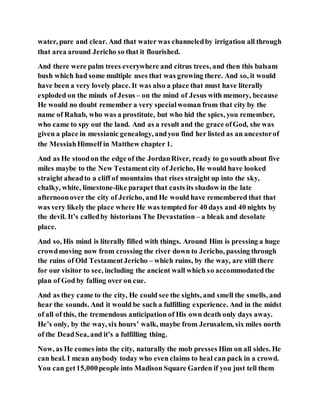
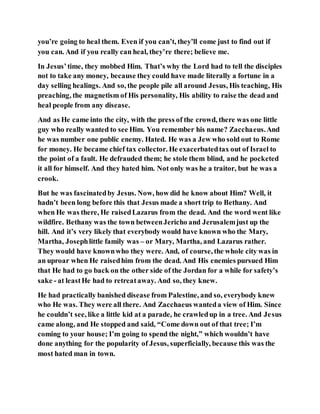
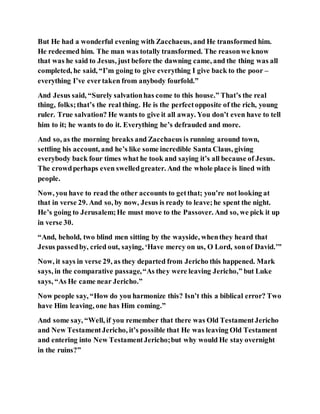
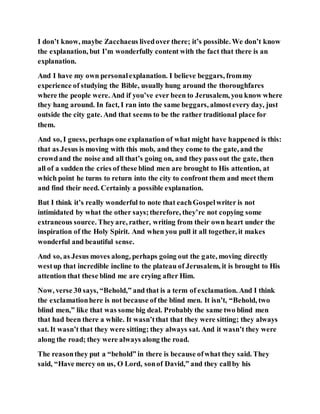
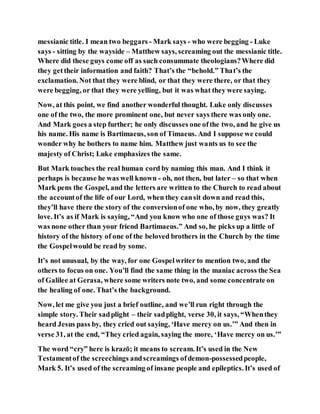
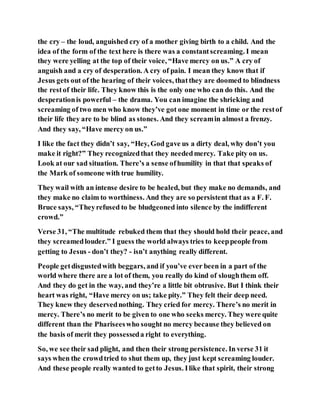
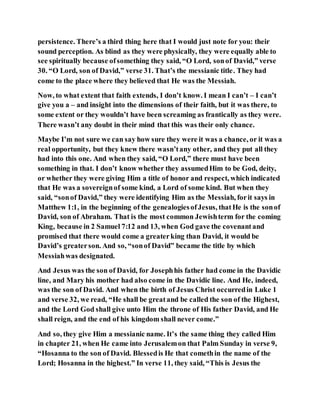
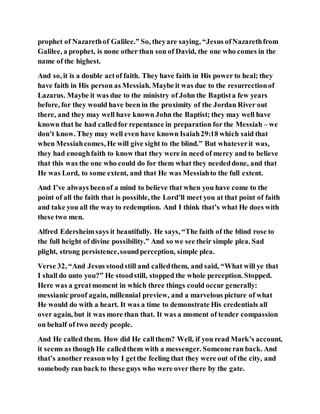
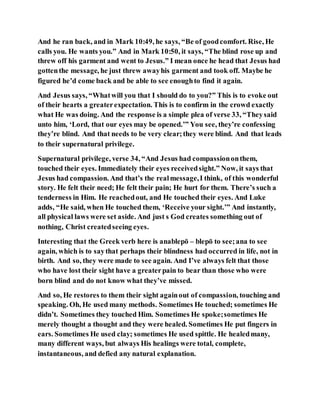
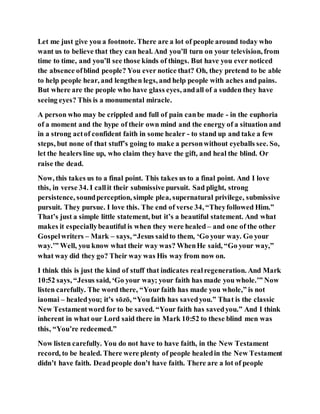
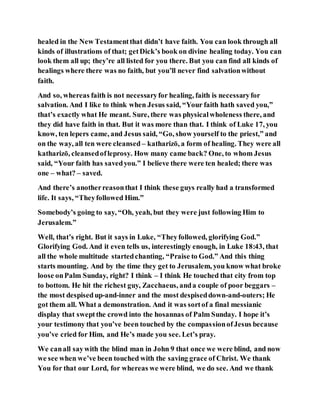
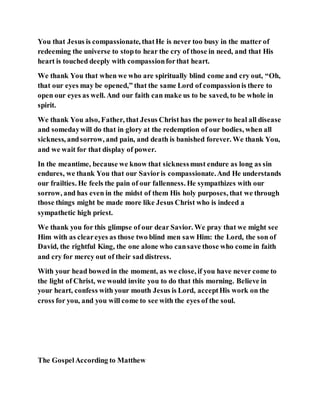
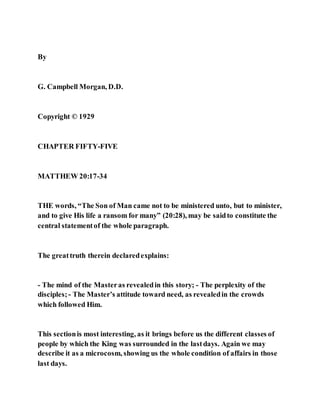
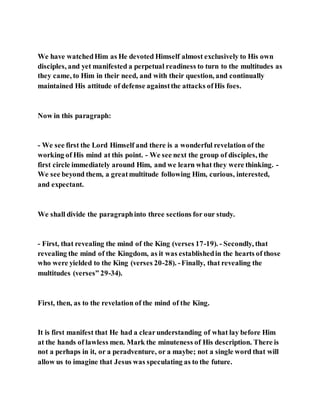
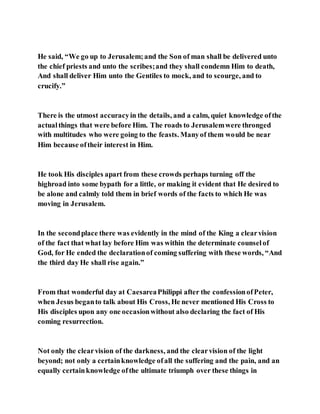
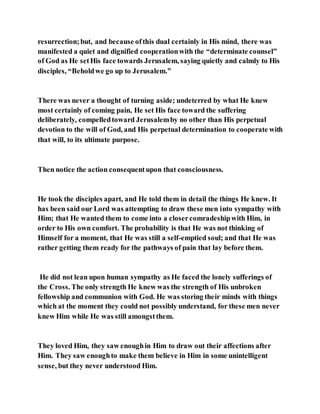
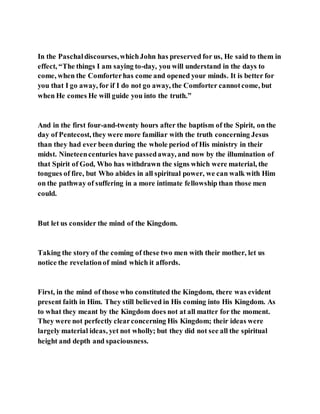
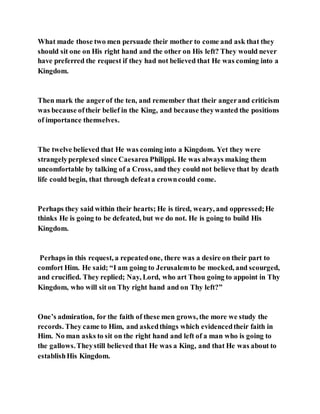
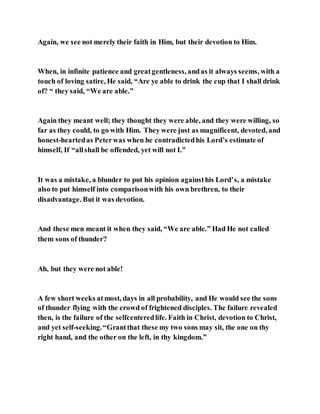
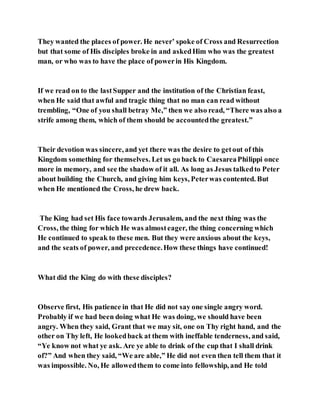
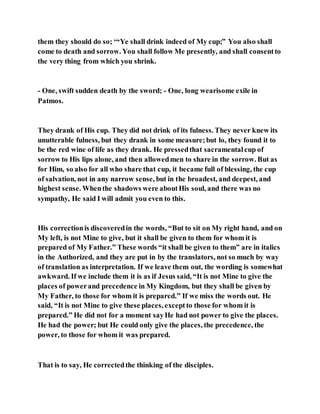
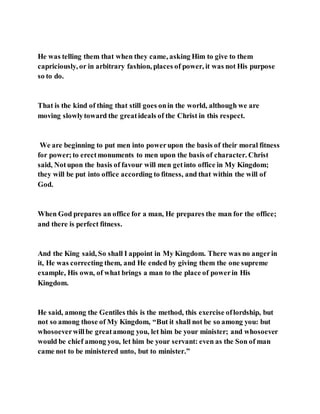
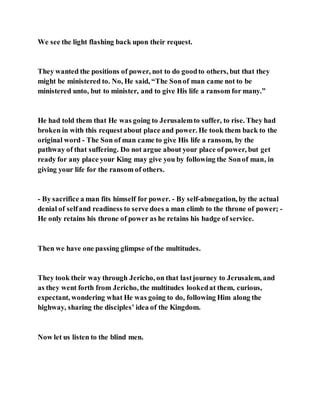
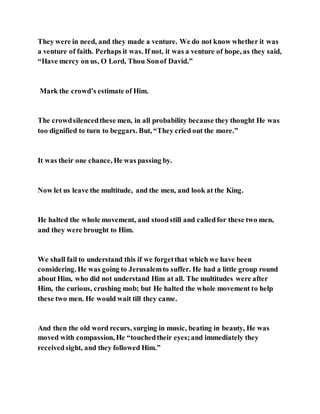
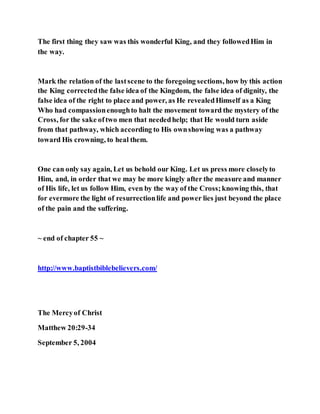
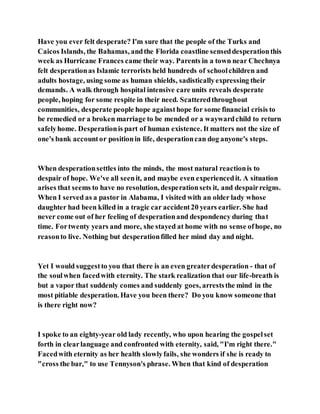
![settles on us, there is only one hope for liberation. And that hope is near! As
Jesus Christ is proclaimed in the gospel, greatmercycomes to desperate
people. All we have to do is recognize how Jesus Christ singles out desperate
people so often in the Gospels to know that He continues to do the same today.
In the midst of soul desperationwe meet the mercy of Christ. Such an
encounter transforms us forever. Have you felt desperationin your soul?
Have you known Christ's mercy in the midst of desperation?
I. The call for mercy
Jesus left the Galileanregion, traveled along the Jordan valley on His wayto
Jerusalem. The Triumphal Entry follows in the next paragraphof Matthew's
Gospel. About a day's journey from Jerusalem, Jesus made His last trip to the
ancient city of Jericho that had been the scene ofIsrael's entrance into the
PromisedLand. Right in the doorway of the land of promise sattwo blind
men living in desperation. Jericho stoodbelow sea levelas an oasis in the
desert. Known for its abundant fig trees and date palms, Jericho also was the
centerfor balsam trees, appreciatedfor its aromatic woodand medicalbalm
made from its "coagulatedjuice." The concoctionwas thought to having
healing properties for the many afflicted with eye problems. So the two blind
men sitting by the road were not the only blind men of Jericho;there were
likely dozens and dozens of others living in Jericho, hoping that the balsam
concoctionwouldheal their blindness [John Broadus, SelectedWorks,vol. 3,
420]. In this setting we hear a callfor mercy.
As Jesus passedby on the road coming from the city of Jericho, two blind men
sat, presumably asking for alms from the travelers heading to Jerusalemfor
the festival. "Hearing that Jesus was passing by," they "cried out, "Lord,
have mercy on us, Son of David!" Inappropriate! Or so thought the crowd of
people on the road as they chastisedthe men for making such a scene. But
desperate people, when hope is near, cannotbe silent.](https://image.slidesharecdn.com/jesuswascompassionate-191122002115/85/Jesus-was-compassionate-97-320.jpg)
![1. Nature of mercy
These men called for mercy. "Lord, have mercy on us, Son of David." The
choice of words is by no means the solitary time we've heard this. Two blind
men in the Galileanarea used similar language, "Have mercy on us, Lord,
Son of David" (Matt. 9:27). So did the Canaanite woman whose daughterwas
cruelly possessedby demons, "Have mercy on me, Lord, Son of David" (Matt.
15:22). A father, overwhelmed by the demon possessionofhis son that caused
him to be thrown into fire and water in attempted destruction, cried, "Lord,
have mercy on my son" (Matt. 17:15). Why did they use the phrase, "Lord,
have mercy on us"? Why not simply, "How about giving me a hand!" or "Do
something for me!" Why mercy?
Mercy is an appeal to the goodness ofsomeone much greater;in this case, it is
the goodnessofGod. Theologiansoftenconsidermercy as a subordinate
categoryto the attribute of God's goodness. Louis Berkhofcalls mercy, "the
goodness orlove of God shownto those who are in misery or distress,
irrespective of their deserts" [Systematic Theology, 72]. So, mercyis action
that flows from God's love toward those in desperate straits. Wayne Grudem
is simpler. "God's mercy means God's goodnesstowardthose in misery and
distress" [Systematic Theology, 200]. God revealedHimself as a merciful,
compassionateGodas He passedbefore MosesonMount Sinai. This was
Moses'secondtrip to the Mountain when he returned to replace the two
tablets of the law that he had earlier brokenat the sight of Israel's rebellion.
Moses neededbetter understanding of the nature and characterofGod, so the
Lord passedby and proclaimed, "The Lord, the Lord God, compassionate
and gracious, slow to angerand abounding in lovingkindness [hesedor
covenantmercy] and truth; who keeps lovingkindness for thousands, who
forgives iniquity, transgressionand sin" (Ex. 34:6-7). Moses, andall Israel
needed to understand that God is merciful. Many times they would need to](https://image.slidesharecdn.com/jesuswascompassionate-191122002115/85/Jesus-was-compassionate-98-320.jpg)
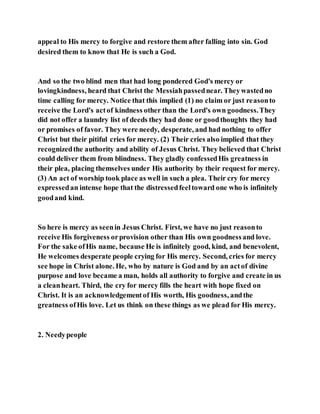
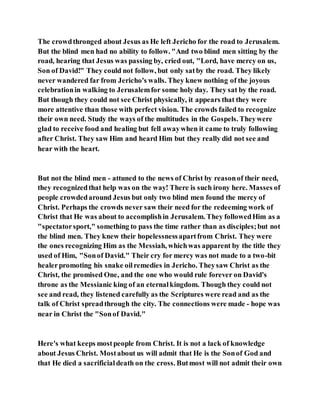
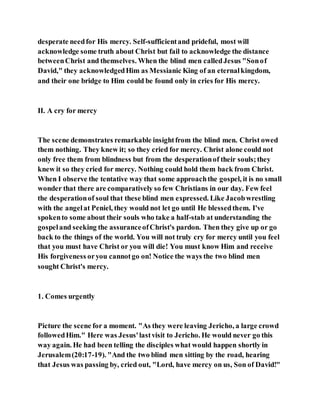
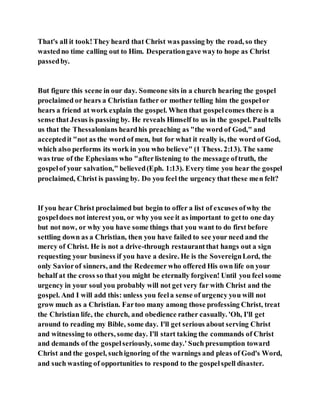
![2. Comes persistently
Urgency can be seenin the way it develops persistence in seeking Christ,
obeying Him, and following Him. "The crowd sternly told them to be quiet."
The word implies the crowd's strong disapproval of the blind men's cries for
mercy. Scolding and shaking their fingers at them didn't stifle these fellows
for a moment. "But they cried out all the more, "Lord, Son of David, have
mercy on us!" They were "diligent in use of means," as J. C. Ryle expressedit
[CrosswayClassic Commentaries:Matthew, 187]. Christwas passing by, and
they did not want to pass up the chance to experience His mercy. So they
hastenedin their callto Christ, ignoring the crowd and focusing upon Christ.
Are you that intent on knowing Christ and following Him?
3. Comes single-mindedly
We've all been told since we were children, "Don't follow the crowd!" Well, in
this case, the crowddid their best to dissuade the blind men to stop their all-
out pursuit of Christ. Index fingers across lips;sounds of shhhh... filling the
air, would have silencedmost. 'Everyone will think you are a fanatic! Be
quiet!' 'You embarrass everyone by your piety!' 'Be quiet or you'll never have
any friends!' 'This is no time to make such a fuss; quit embarrassing us!'
The single-mindedness of the blind men kept them focusedon one thing:
receiving mercy from Christ. If they had listened to the crowd they would
have gone to the grave blind and lost. And my friend, the same is true with
eachof us. If we listen to the world, we will never know the blessing of Christ
on our lives.](https://image.slidesharecdn.com/jesuswascompassionate-191122002115/85/Jesus-was-compassionate-103-320.jpg)
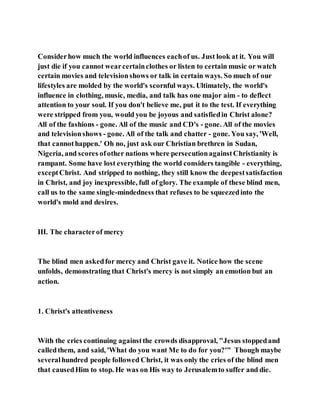
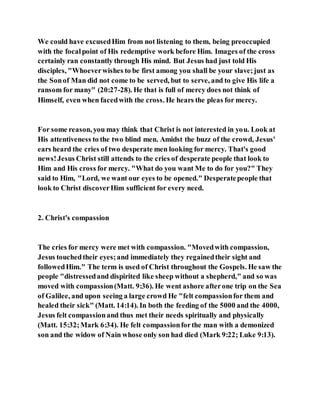
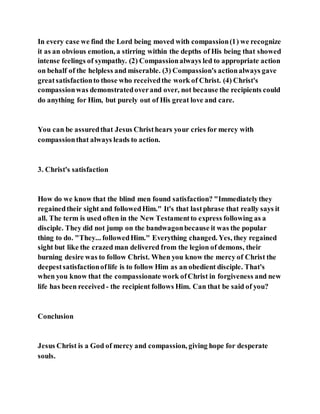
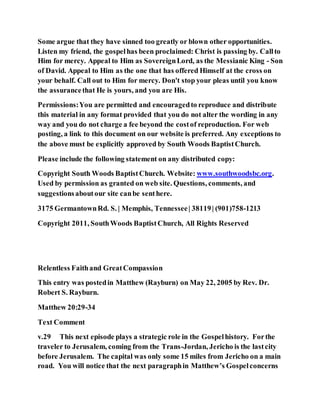
![the Triumphal entry into Jerusalemon Palm Sunday. Imagine the scene.
Jesus is not alone with his disciples on this road through Jericho. It is
crowdedwith pilgrims heading to Jerusalemfor Passover. We know from the
other Gospels that popular excitement over the possibility that Jesus was the
Messiah, fueledby his miracles and by his teaching, was now reaching a fever
pitch. Passoverwas, in any case, the most patriotic time of year for the Jews.
So there is nothing surprising in the fact that a crowdof people would have
attachedthemselves to Jesus to walk with him toward Jerusalem. This
dramatic miracle, witnessedby so many people, would only have inflamed
people’s expectations the more. News ofit would have reachedJerusalem
only a few hours later. In Matthew’s accountthe pre-Jerusalemministry
concludes with this miracle. We know from the other Gospels that, in fact,
some days were to elapse before Palm Sunday. But take note, it was to be the
crowds’disappointment … Jesus, his failure to meet their expectations that
would secure his execution some days later. They were looking for a political
deliver not a Redeemer.
v.30 Mark names one of these blind men: Bartimaeus. The fact that his
name was known probably is an indication that he was known among the
believers as a disciple of Jesus. The factthat he is named only in Mark, which
is, as you remember, Peter’s Gospel, may indicate that he was a personal
acquaintance or friend of the Apostle Peter.
When the blind men call Jesus “SonofDavid,” they are calling him Messiah,
for that is what the title meant. Even beggars onthe streetknew of the
remarkable ministry of Jesus of Nazarethand were caught up in the
excitement generatedby the growing belief that the Messiahhad appeared.
They knew of the miracles of healing that Jesus had performed and they
hoped for something for themselves.
v.31 It is entirely typical that the demonstration of Jesus’Messiahship
should have been provided in a work of compassionandkindness that the
crowdthought was beneath his dignity. [France, 294]How little they
understood of what was to come.](https://image.slidesharecdn.com/jesuswascompassionate-191122002115/85/Jesus-was-compassionate-108-320.jpg)
![How often in the NT is true and living faith in Christ described as a conviction
of Christ’s willingness and ability to help – as no one else can– that it refuses
to take “no” for an answer. These are men who believed in Christ’s power to
save them.
v.32 By stopping and attending to these blind beggars Jesus is once more
overturning and repudiating the popular understanding of what the Messiah
would be and would do.
v.33 If you were blind is this not what you would ask for?
There is no accountof the giving of sight to the blind in the OT, no such
miracle performed by Moses orElijah or Elisha. Noris there any such
miracle reported in the NT as having been performed by the apostles after
Pentecost. Butthere are more miracles of this type – giving sight to the blind
– reported among the healing miracles of the Lord than of any other type of
healing miracle. Perhaps that is because in the Old Testament, giving sight to
the blind was not only something that Godalone could do, but further,
something that the Messiahwould do!
“Then shall the eyes of the blind be opened and the ears of the deaf
unstopped.” [Isa. 35:5]
“Here is my servant, whom I uphold, my chosenone in whom I delight…I will
keepyou and will make you to be a covenantfor the people and a light for the
Gentiles, to open eyes that are blind and to free captives from prison… [Isa.
42:7]
To open the eyes of the blind is supremely a revelationof Jesus Christ as the
Son of God and the Messiah.
But, as we have also often noticed, the Lord’s miracles were important not
only for the proof they provided of the Lord’s credentials as the Messiah, they
were also pictures of the salvationthat Jesus had come into the world to
provide. The dead being raised, the demon possessedbeing restoredto sound
mind, the leper cleansed, andthe blind given his sight are not only astonishing
works of divine power, works that no one could perform but someone who
had been given powerfrom on high, but all are ways in which the Bible](https://image.slidesharecdn.com/jesuswascompassionate-191122002115/85/Jesus-was-compassionate-109-320.jpg)
![describes the nature of salvation. We are dead in sins and in Christ we are
made alive. We are slaves ofthe Devil but Christ sets us free. We are impure,
as the leper, but Christ makes us clean. And we are blind – we cannotsee the
truth about God, about the world, about ourselves, about the way of salvation
– and Christ opens our eyes to see the truth that sets men free.
In the case ofthe man born blind, whose healing John records in the 9th
chapter of his Gospel, this point is made explicitly: the granting sight to the
blind in the physical sense, miracle that it was, was a picture of the giving of
spiritual sight to the spiritually blind. There Jesus said,
“Forthis I have come into this world,, so that the blind will
see and those who see will become blind.” [v. 39]
The Lord was speaking to the intransigent Pharisees andtelling them that no
matter how good their physical vision, they were blind spiritually, and the
proof was that the Son of God was standing in front of them and they couldn’t
see him for what he was, no matter the miracles, no matter the truth that was
on his lips, no matter the perfectgoodness ofhis life. He said that if they
thought they were seeing, as they did, they would remain blind.
Think of our friend, John Rug, the missionary to Chile, who also was born
blind, was born blind in both senses, but later as a young man was given sight
by the Lord Jesus Christ. For some years yet he will not be able to see in the
physical sense, but he has for many years been able to see in the more
important sense. Indeed, those who know John will sayof him that he has
very acute vision when it comes to seeing the truth and the light that is in
Jesus Christ. And, in the same way, we know many people who have very
goodeyesight, but who are blind as bats when it comes to seeing what is truly
and eternally important.
Well it is this point that is made here also in Matthew. You will have noticed
the lasttwo words of our text: these two men whom Jesus had healed of their
blindness followed him. Those are potent words in Matthew. These men
became Christ’s followers right then and there. We might have expected
them to go to the city and seek outtheir relatives and see their homes for the](https://image.slidesharecdn.com/jesuswascompassionate-191122002115/85/Jesus-was-compassionate-110-320.jpg)
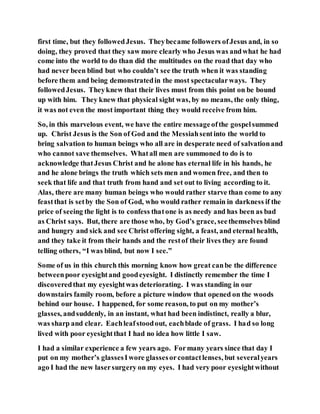
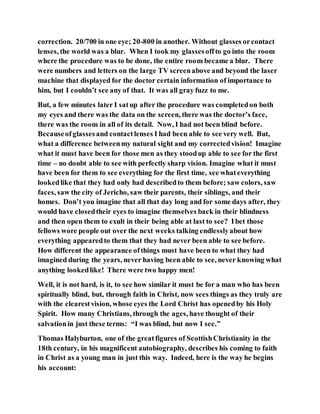
![“I cannot be very positive about the day or hour of this deliverance, nor can I
satisfy many other questions about the way and manner of it. But this is of no
consequence,if the work is in substance sound, for ‘the wind bloweth where it
listeth; and thou hearestthe sound thereof, but canstnot tell whence it
cometh, and whither it goeth; so is everyone that is born of the Spirit.” (John
iii. 8) Many things about the wayand manner we may be ignorant of, while
we are sufficiently sure of the effects. As to these things, I must say with the
blind man, ‘I know not: one thing I know, that whereas I was blind, now I
see.”
Through the reading of the Word of God and praying for light, the Lord came
to him and opened his eyes near the end of January in 1698. And that is how
he puts it and how he thought about his conversion. It was an opening of his
blind eyes. Indeed words like “see” and“sight” are found all through the
account. And true Puritan that he was, he proceededto describe in nine
particulars. He says it was 1) a heavenly light, it shone above me, it opened
heaven to me, and led me up, as it were, to heaven; 2) a true light, exposing
the falsehoods abouthimself and the world and God that he had so long
entertained; 3) a pleasantlight; 4) a distinct and clearlight; 5) a satisfying
light; 6) a refreshing and healing light, it warmed him and his life; 7) a great
light; 8) a powerful light, dissipating the thick darkness that had overspread
his mind; and 9) a composing light; not like lightning that appears in a
moment and disappears leaving terror behind, but composedand quieted his
soul that had been troubled about so many things. Then he concludes, “…I
know that no words can express the notion that the weakestChristian, who
has his eyes opened, really has of [the glory of this light.] … No words can
convey a true notion of light to the blind; and he that has eyes…willneed no
words to describe it.” [Memoirs, 99-104]
Don’t you suppose that the blind men to whom the Lord gave sight would
have describedtheir experience in very similar terms? And, don’t you know
that, finally, they exulted far more in the spiritual sight that they had been
given, the knowledge ofChrist and salvation, than the sight of his eyes. I
guarantee you that more than once in the remaining years of those men’s lives
they told people that they would rather have remained blind all their days if](https://image.slidesharecdn.com/jesuswascompassionate-191122002115/85/Jesus-was-compassionate-113-320.jpg)
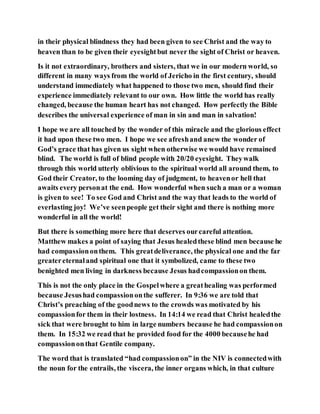
![were regardedas the seatof the emotions. One scholarof the language ofthe
New Testamentwrites that, in distinction from the word “heart,” this is “a
more blunt, forceful and unequivocal term.” [TDNT, vii, 549] It is
interesting, by the way, that Greeks thoughtof strong emotion ordinarily in
terms of anger;Christians, on the other hand, thought of compassion.
[Morris, 238] This word, “have compassion” is always connectedwith Jesus
in the New Testament. Whatwe have here is not mere human pity, but divine
compassionfor troubled people filling a human heart. We have the heart of
the Sonof Godgoing out to those in greatneed.
Now if, as we have said, we have here not only the record of one of the
breathtaking miracles that Jesus performed but a picture of salvationcoming
to lost men, then this compassionis part of that beautiful picture. How does
the life-giving power of God in Christ come to men and womenin our day?
“We are fooling ourselves if we [think] that we can ever make the authentic
gospelpopular … It’s too simple in an age of rationalism; too narrow in an
age of pluralism; too humiliating in an age of self-confidence;too demanding
in an age ofpermissiveness…. Whatare we going to share with our friends?
[Dudley Smith, John Stott, ii, 267]
We canshare the light, the sight that Christ gave to these blind men with the
blind men around us. We cannot give physical sight to the blind, but we can
shed the light on the spiritual blindness of those around us. But what will
make them pay attention to us and receive our words? If we speak for the
same reasonthat Jesus did so. Love breaks into blindness like nothing else.
Love can make a self-confident man realize his terrible need, a man who
thinks he sees suddenly realize that he has lived his whole life in darkness.
The world around us is full of the blind. I was at Safeco FieldFriday night,
the stadium full of thousands of folk, eating, drinking, having fun – most of
whom did not know their right hand from their left, were blind to the sight of
all that is truly, eternally important. They are not crying out on purpose, in
many cases,as these blind men did near Jericho, but their circumstances are
evidence of their darkness. Theircondition is obvious enough to us. We can
see that they cannot see. We canoften see the misery that must be endured by](https://image.slidesharecdn.com/jesuswascompassionate-191122002115/85/Jesus-was-compassionate-115-320.jpg)
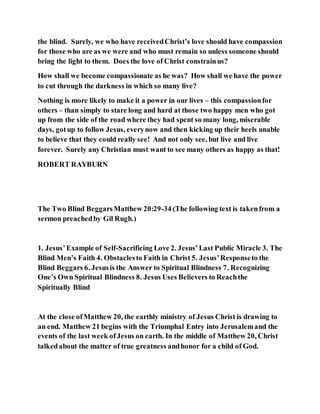
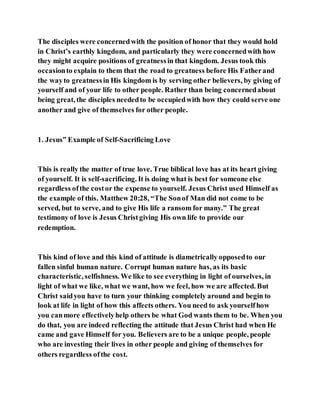
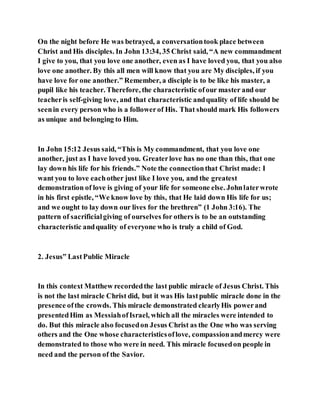
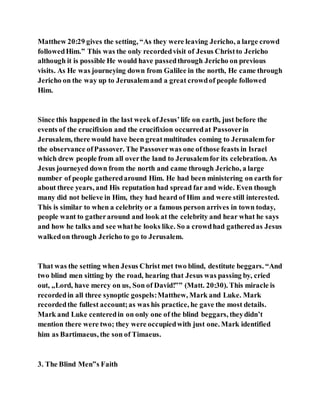
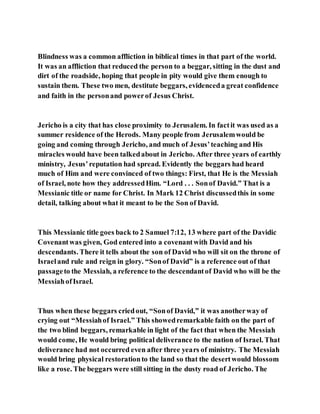
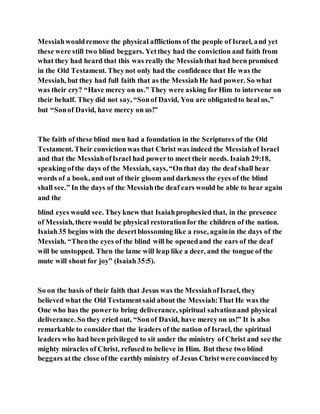
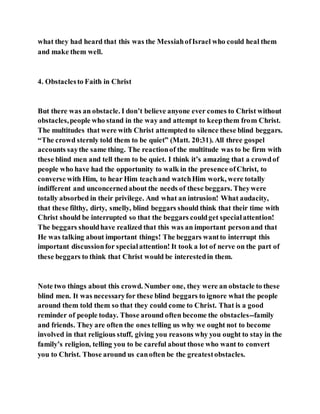
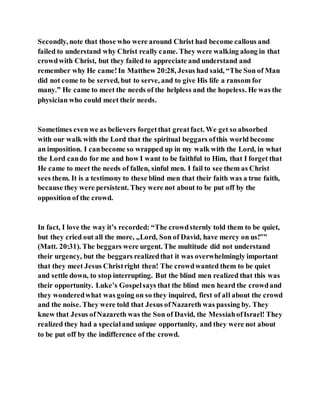
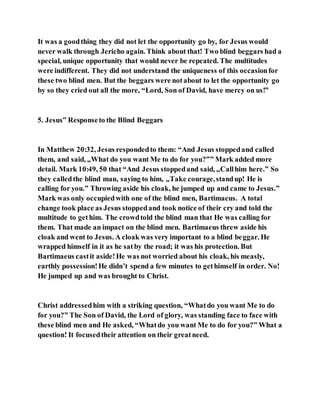
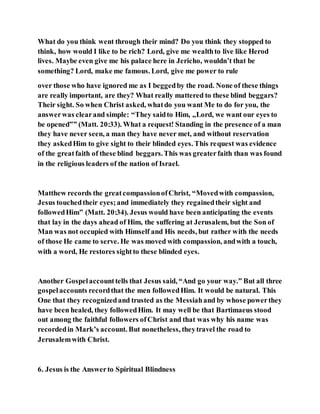
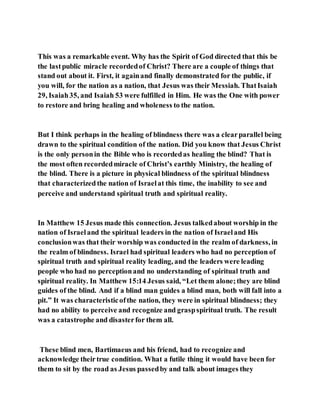
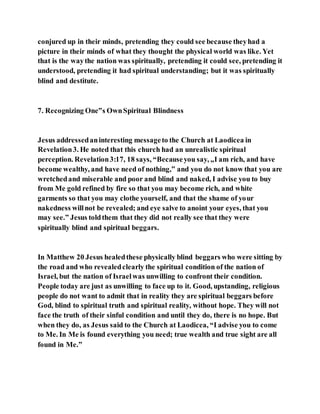
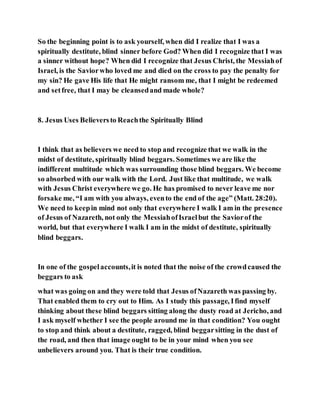
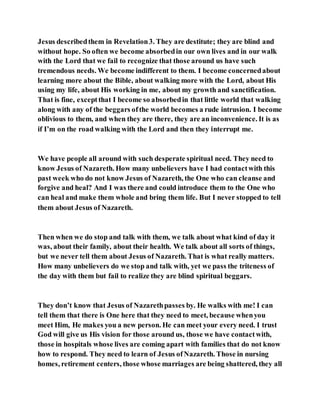
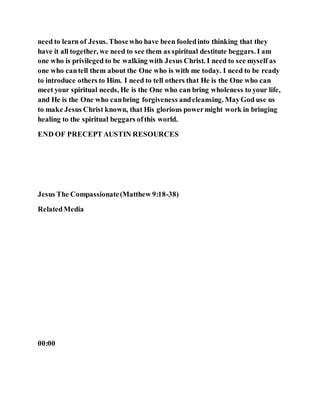
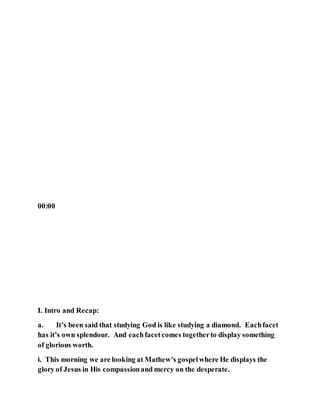
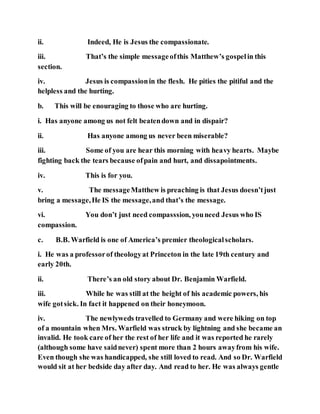
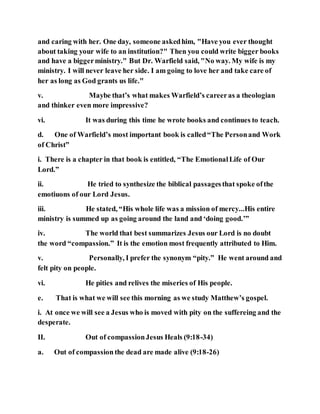
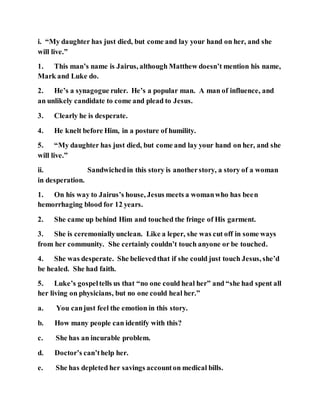
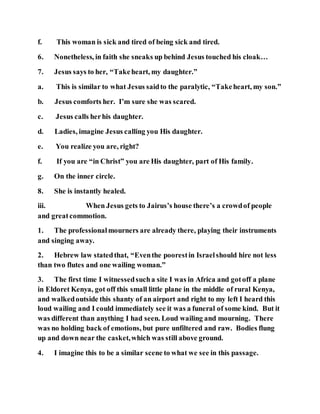
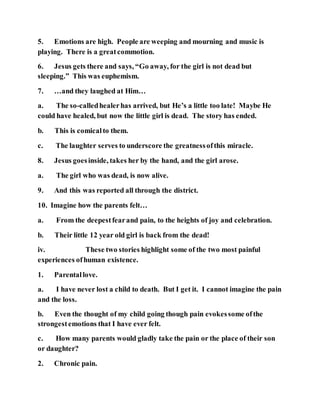
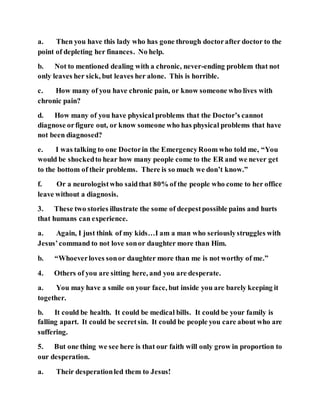
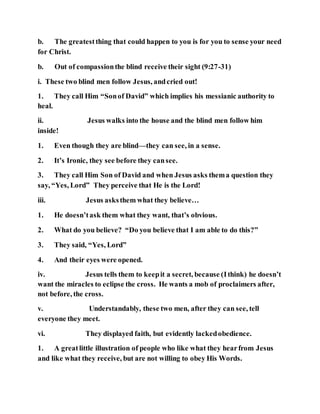
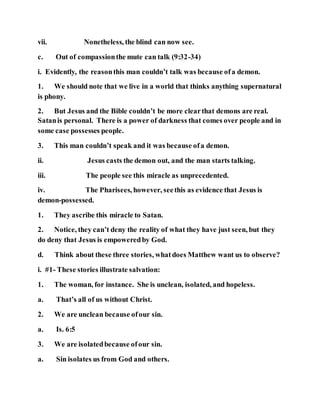
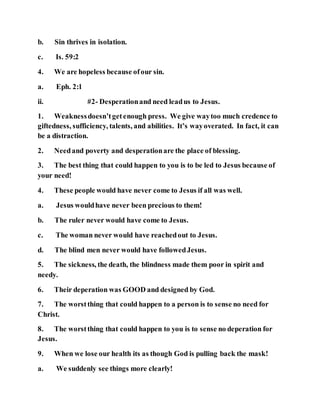
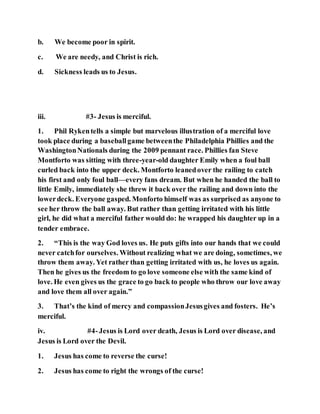
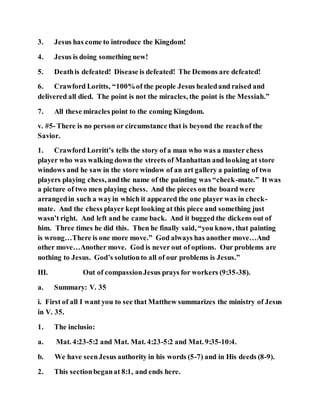
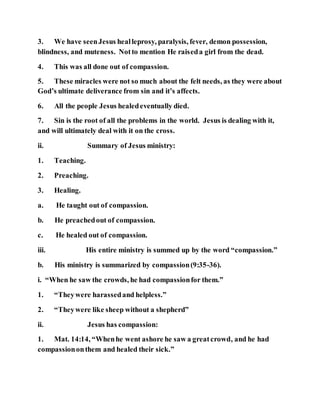
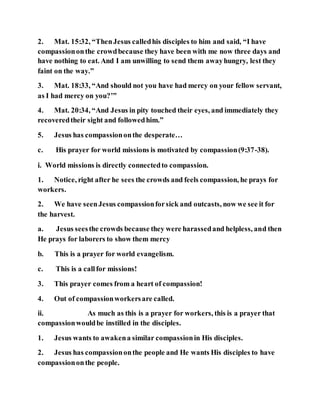
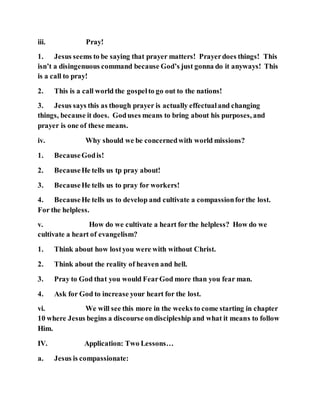
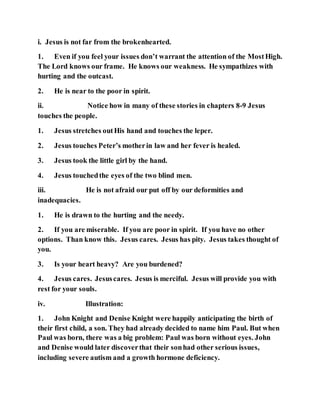
![2. Two months after Paul's birth, as John was looking at his sonhookedup
to tubes and sensors and surrounded by medical professionals, he quietly told
God, "God, you are strong, that's true, and you are wicked. You are mean. Do
it to me—not to this boy. What did he ever do to you?" Shortly after that
prayer, John and Denise stopped going to church.
3. But one couple from the church refused to give up on them. Karl and
Gerilyn never pressured John and Denise aboutspiritual issues. Instead, they
would often stopby and leave simple gifts, like a loafof fresh bread or a
basketof soapand shampoo for Denise. John said that it was like Karl and
Gerilyn were saying, "I notice you. I see you. I know you're hurting and I love
you."
4. Eventually John and Denise accepteda dinner invitation from Karl and
Gerilyn. During dinner John told Karl, "You canbelieve whateveryou want.
I don't care. I have evidence that God is cruel." Karl softly replied, "I love
you, John. I have regard for you, and I love your boy."
5. Karl and Gerilyn's four children also showedand lived unconditional
love for their son. John describedit this way:
a. They'd throw [my son]up in the air and make him laugh and do funny
bird sounds and—and that was confounding, because mostpeople, most
adults couldn't do that. And so I would have this extraordinary expressionof
love and affectionat the dinner table here, and I would turn to my left—and
there would be at leastone of these children playing with my boy like he was a
real boy. I wasn't even sure he was a realboy at times.
v. This family illustrates the accurate kind of love and
compassionthat Jesus has for us.
vi. Jesus is compassionate!
b. Jesus is calling His disciples to be compassionate.
i. CompassionmarkedJesus, it should mark His disciples.
1. Jesus evenprays that His followers with be moved with compassionlike
He was.](https://image.slidesharecdn.com/jesuswascompassionate-191122002115/85/Jesus-was-compassionate-147-320.jpg)
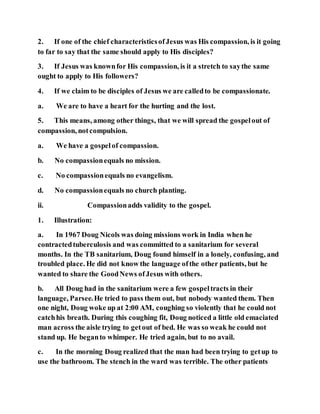
![were angry at the old man for not being able to contain himself. The nurse
cleanedup the mess and then slapped the man.
d. The next night, againDoug saw the old man trying to getout of bed, but
this time Doug gotout of bed, icedup the old man, and carried him to the
toilet (just a hole in the floor) and then brought him back to his bed. The old
man kissedDoug on the cheek and promptly went to sleep.
e. Early the next morning, Doug awoke to a steaming cup of tea beside his
bed. Another patient had kindly made it for him. The patient motioned that
he wanted one of those gospeltracts. The next two days, one after another
patient asked, "CouldI have one of those tracts too?"
2. World magazine last year had as their “book ofthe year” a book by a
sociologistRodneyStark.
a. I don’t know whether or not Rodney is a Christian. The book is not
written from a Christian perspective, but from a historicaland sociological
perspective.
b. Rodney askedthe question, “How did the birth of Jesus change the
world?”
c. Stark argues that there was one huge factorthat helped capture the
attention of the ancient world—Christianity's revolutionary emphasis on
mercy.
d. Stark writes: In the midst of the squalor, misery, illness, and anonymity
of ancient cities, Christianity provided an island of mercy and security ….. It
started with Jesus ….
e. In contrast, in the pagan world, and especiallyamong the philosophers,
mercy was regardedas a characterdefectand pity as a pathologicalemotion:
because mercyinvolves providing unearned help or relief, it is contrary to
justice …. [Thus] humans must learn "to curb the impulse [to show mercy]";
"the cry of the undeserving for mercy" must go "unanswered." "[Showing
mercy] was a defect of characterunworthy of the wise and excusable only in](https://image.slidesharecdn.com/jesuswascompassionate-191122002115/85/Jesus-was-compassionate-149-320.jpg)
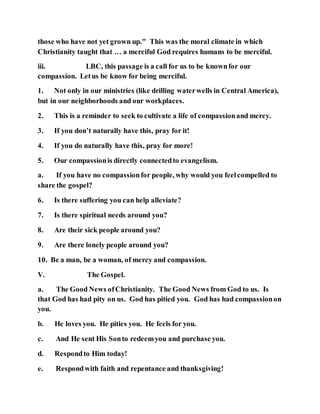
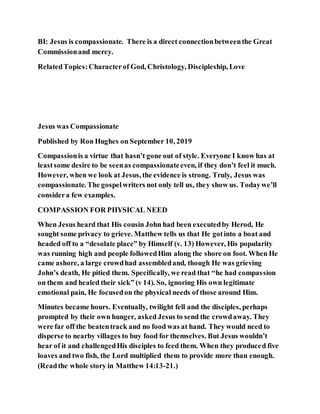
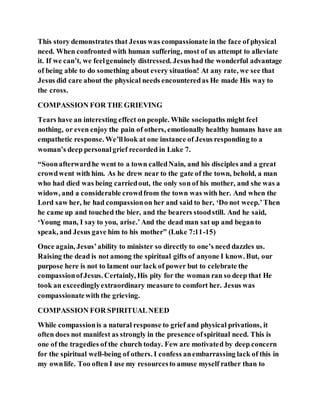
![touch the lives of people around me. Allow me to divert this uncomfortable
thought to considerJesus as our example in responding to spiritual need.
In Matthew 9, we read that “Jesus wentthroughout all the cities and villages
[of Galilee], teaching in their synagogues andproclaiming the gospelof the
kingdom and healing every disease and every affliction. When he saw the
crowds, he had compassionfor them, because they were harassedand
helpless, like sheep without a shepherd” (Matthew 9:35-36). We know from
the previous example that He had compassiononthe crowdbecause oftheir
physical needs. Here the Spirit draws our attention specificallyto His
compassionfor their spiritual needs. Jesus saw beyondthe obvious and
recognizedthat they were floundering spiritually.
LACK OF COMPASSIONATELEADERSHIP
The Jewishleadershipof the time was largelycorrupt and consumedby two
things. One was the infighting betweenPharisees andSadducees. The other
was trying to stay in the goodgraces ofRome so they could maintain what
control they had. Consequently, the everyday ordinary Jews found themselves
largely ignored. That Rome had no compassionforthem does not surprise us.
But that their ownspiritual leaders provided no meaningful direction was a
real shame.
Jesus had this to say in Matthew 23. “The scribes and the Pharisees siton
Moses’seat,so practice and observe whateverthey tell you—but not what
they do. For they preach, but do not practice. Theytie up heavy burdens,
hard to bear, and lay them on people’s shoulders, but they themselves are not
willing to move them with their finger. They do all their deeds to be seenby
others” (Matthew 23:2-5). No wonder that when the common people observed
that Jesus was compassionate, theyflockedto Him.
A LIFE OF COMPASSION
These examples mention the word “compassion”as the motivation for Jesus’
actions. Yet as we read the gospels, we see many more which demonstrate the
emotion without mentioning the word. Consider the story of the raising of
Lazarus (see John 11). Here we see Jesus so touchedby the plight of Mary and](https://image.slidesharecdn.com/jesuswascompassionate-191122002115/85/Jesus-was-compassionate-153-320.jpg)
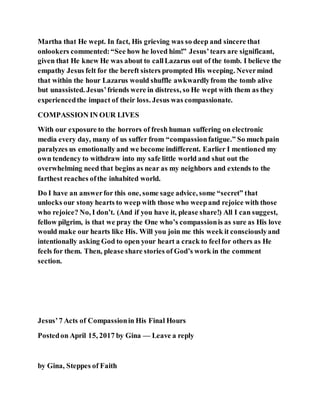
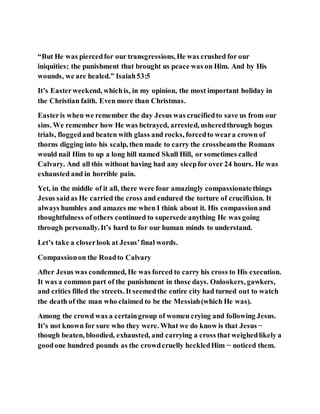
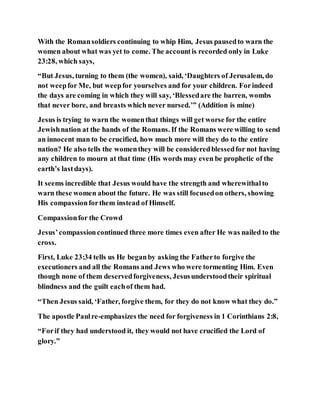
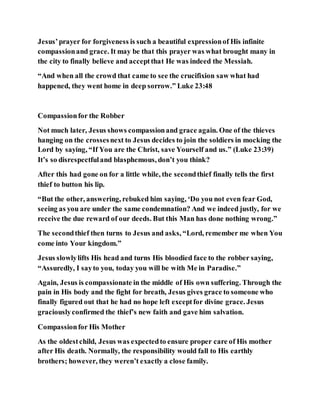
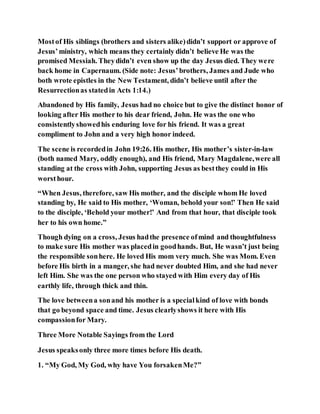
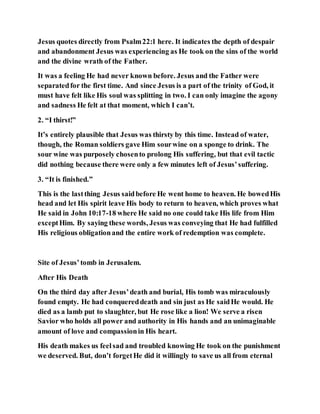
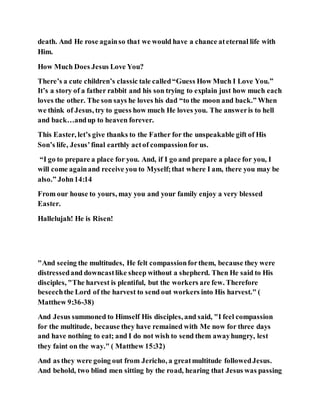
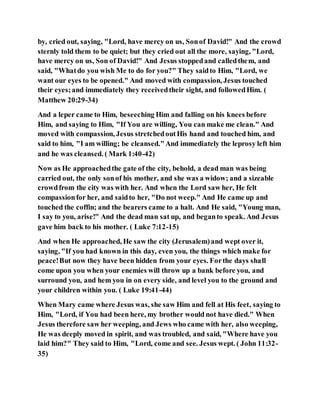
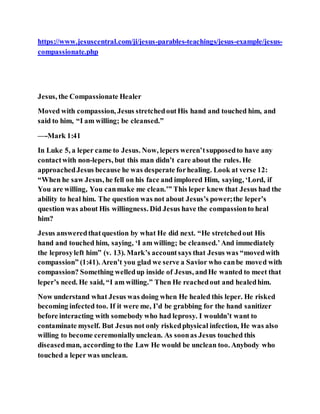
![This is a greatpicture of what Jesus does for us. Even though Jesus was the
sinless, perfectSon of God, He was willing to become contaminatedfor us. He
was willing to reachout and take our sin and bear it upon Himself so He could
provide us with the righteousness ofGod.
What Jesus did next was strange. “He ordered him [the leper] to tell no one”
(v. 14). Obviously, Jesus didn’t know anything about public relations. I mean,
if you heal somebodyaren’t you supposed to tell everyone about it so you will
get a big following? Jesus knew that miracles in and of themselves don’t
convert anybody, so He ordered the man to tell no one.
Notice what Jesus saidnext to the man: “Go and show yourself to the priest
and make an offering for your cleansing, just as Moses commanded, as a
testimony to them” (v. 14). Leviticus 14 said if somebodyis healedfrom
leprosy, he needs to tell the priest so the priest can verify the healing. So the
former leper went to see the priest. Remember, nobody had been healed from
leprosy for hundreds of years. Imagine the priest looking at the scars that
proved the man had been a leper but was now completely free from the
disease. This healing was Jesus’s wayof announcing to the priest that the
Messiahhad arrived.
***
Today’s devotion is excerpted from “Jesus,the PerfectHealer” by Dr. Robert
Jeffress, 2016.
Scripture quotations are takenfrom the NEW AMERICAN STANDARD
BIBLE®, Copyright © 1960, 1962,1963, 1968, 1971,1972, 1973, 1975,1977,
1995 by The Lockman Foundation. Used by permission.
JOHN MACARTHUR](https://image.slidesharecdn.com/jesuswascompassionate-191122002115/85/Jesus-was-compassionate-163-320.jpg)
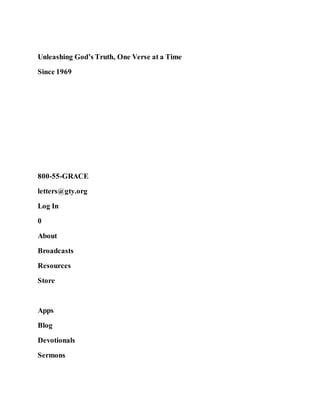
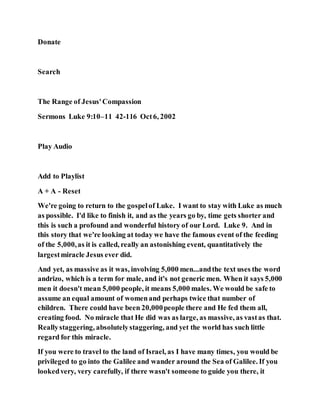
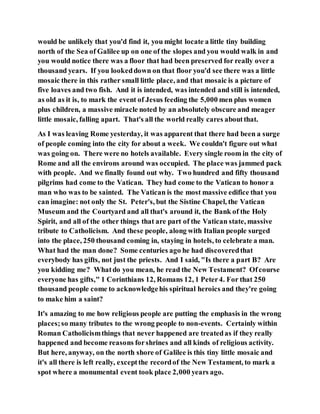
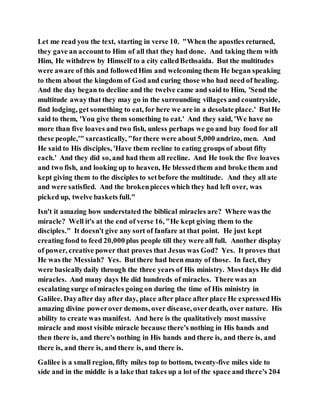
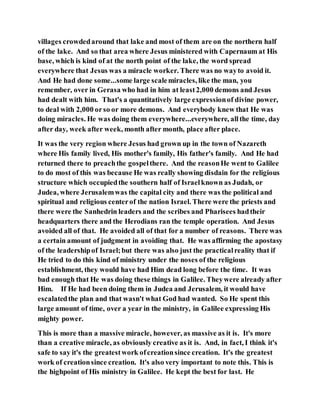
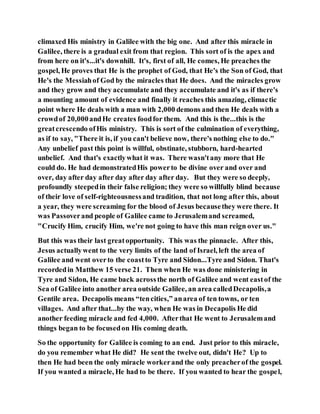
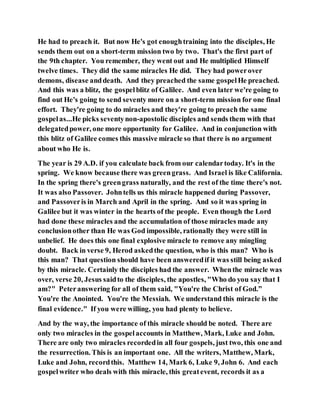
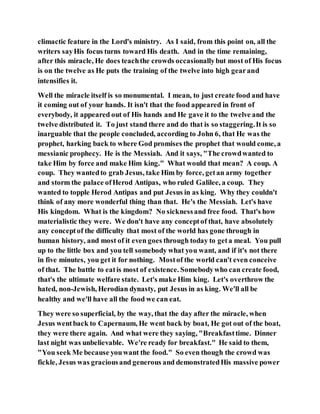
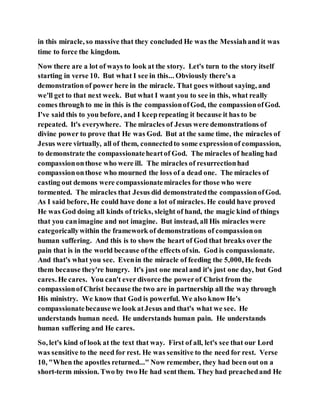
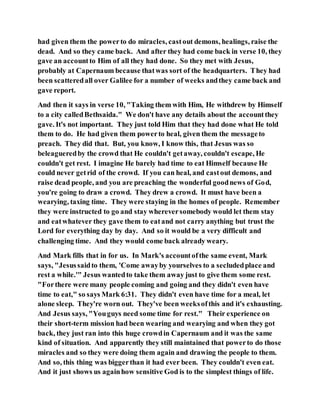

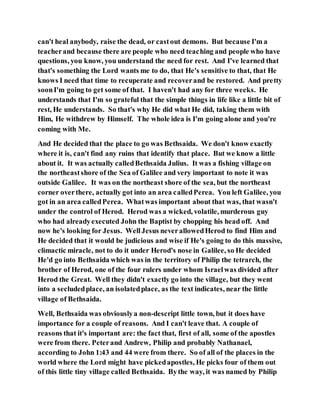
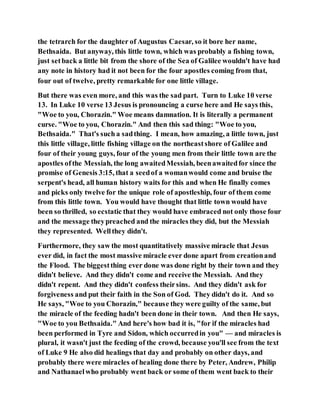
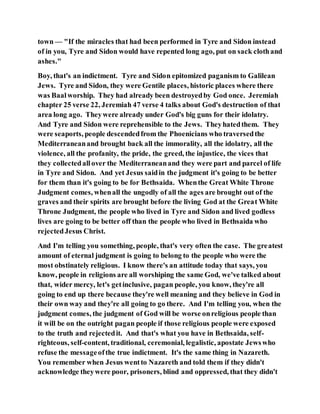
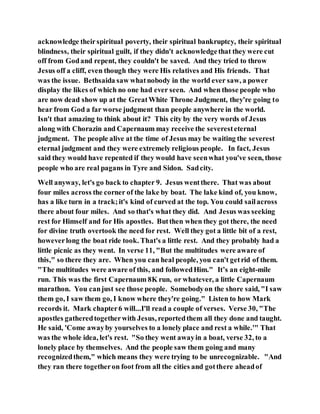
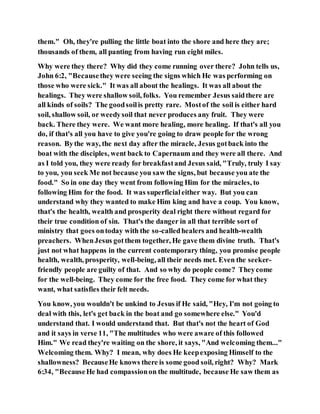
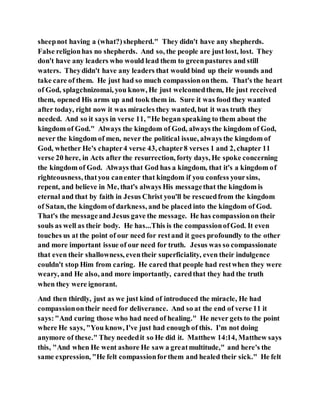
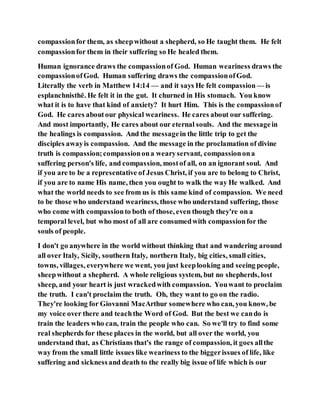
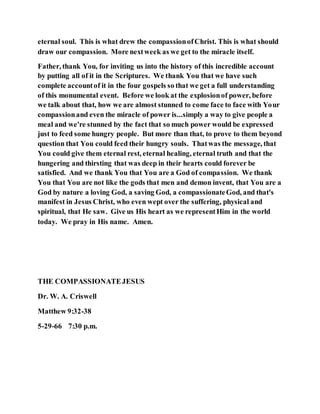
![You who share the service on radio turn with us in your Bible to Matthew
chapter 9, the ninth chapter of the First Gospel, Matthew. We shall begin
reading at verse 32 and read to the end of the chapter. You are sharing the
services ofthe First BaptistChurch in Dallas. This is the pastor bringing the
evening messageentitled The Compassionate Jesus, the sympathizing Jesus.
Those words are exactly the same. “Sympathy” is a Greek word;
“compassion” is a Latin word. They are made exactlyalike. They are
compounded of two words meaning the same thing, the sympathizing Jesus,
the compassionate Jesus. And this is the context, Matthew 9:32, and all of us
reading out loud together:
And as they went out, behold, they brought to Him a dumb man possessed
with a devil.
And when the devil was castout, the dumb spake:and the multitudes
marveled, saying, It was never so seenin Israel.
But the Pharisees said, He castethout devils through the prince of the devils.
And Jesus wentabout all the cities and villages, teaching in their synagogues,
and preaching the gospelof the kingdom, and healing every sicknessand
every disease among the people.
But when He saw the multitudes, He was moved with compassiononthem,
because they fainted, and were scatteredabroad, as sheephaving no
shepherd.
Then saith He unto His disciples, The harvest truly is plenteous, but the
laborers are few;
Pray ye therefore the Lord of the harvest, that He will send forth laborers into
His harvest.
[Matthew 9:32-38]](https://image.slidesharecdn.com/jesuswascompassionate-191122002115/85/Jesus-was-compassionate-183-320.jpg)
![For all of the wondrous, compassionateworks ofour Savior, He was more
maligned, and calumniated, and despised than any other teacherwho ever
taught. The cynicism of those who hated Him was almost beyond endurance,
for, after He had wrought this marvelous miracle of healing and restoration,
“and the multitudes marveled, saying, It was never, never so seenin Israel”
[Matthew 9:33], those cynical Pharisees said, “this guy casts outdemons by
the prince of demons [Matthew 9:34]. He Himself is in league with Satan, and
the powerHe has is satanic and comes from the bottomless pit.” This they
said of the sympathizing Savior. That was their reactionto the marvelous
works that He did. Had he been so criticized, Pythagoras would have closed
his school. Socrates wouldhave dismissedhis pupils. Marcus Aurelius would
have gone home from critics so unspeakablybad and vile.
But what does the Scripture sayof the Savior? When they said such things
about Him, does it read, “And Jesus, whenHe heard what His enemies said
and what His critics avowed, and Jesus, discouraged, left off His preaching
and ceasedHis healing and His ministries of mercy”? “And Jesus, sitting
under a juniper tree, askedthat His life might be takenfrom the earth in the
face of so tragic a criticism”? Does itsay that? No. Forthe next verse, after
it is avowedof what the Pharisees saidofthe Lord [Matthew 9:34], the next
verse says, “And Jesus wentabout all the cities and the villages, teaching in
their synagogues, preaching the gospelofthe kingdom, and healing every
sicknessand disease among the people” [Matthew 9:35]. Whateverothers
might say, and whatever vile and blasphemous word by which they would
castigateHis ministries and mercies of love, He paid no attention, just kept on
preaching the gospelof the kingdom, kept on opening blind eyes, and
unstopping deaf ears, and healing all manner of disease, bringing the good
news of the kingdom to the people [Matthew 11:5].
Ah, what a marvelous way to be! Do you ever get discouraged? And if
somebody says something about you, don’t you have the feeling, “I think I
ought to quit”? Notour Lord. Howeveranyone might say, or criticize, or
describe the work we seek to do in belittling terms, just keeping on as unto
God, like our blessedSavior. Now there’s a reasonfor it, and the next verse
avows it: for when the Lord saw the multitudes in those cities, in those
villages, people everywhere, “WhenHe saw the multitudes, He was moved](https://image.slidesharecdn.com/jesuswascompassionate-191122002115/85/Jesus-was-compassionate-184-320.jpg)
![with compassiononthem” [Matthew 9:36]. Jesus, movedwith compassion, is
His enduring name [Mark 6:34, 8:2]. The response of the Lord, when He saw
greatthrongs and greatmasses ofhumanity, was one of pity and sympathy;
He would weeplooking over a greatcity [Luke 19:41].
We are so different from that. And as I visit in a greatmetropolis and listen
to the people describe its magnitude—and the reasonI think of it so
poignantly now is because I have just been in a tremendous city, one that
covers more area than any other city in the world. And I listen to the citizens
of that metropolis as they describe its length and its breadth and all of the
marvelous things that comprise its glory and grandeur—and we’re that way
about anything multitudinous and tremendous and big. We’re that way about
multitudinous matter, a mountain. You wouldn’t give a dime for a shovelful
of it. You wouldn’t walk fifty yards to see two tons of it. If you had some of it
in your backyard, you’d hire somebodyto haul it away; rubbish, dirt and
rocks, stuff. But let it pile itself up footby foot, and yard by yard, and mile by
mile, until finally it cools itselfin the snows of even the summertime, and it
breathes the rarified air, why, bless your heart, we will take summer vacations
just to look upon it. We’ll build chateaus just to see it. We’ll form excursion
trains to make a trip. We will write of it in our magazines and in our papers
and in our descriptions of all of the things to see where we live, because ofits
piled-up height and its grand and marvelous multitudinous size, its impressive
greatness.
And we’re that way about a city. This tremendous city: look at its great
boulevards, and its bright lights, and all of the attractiveness, andall of the
things of interestin it. Look at this greatpopulation numbering millions!
What might and what power! Why, I suppose about the last thing we would
ever do would be to look on a vastpanorama of a city before us and feel
thoughts and responses ofsympathy and compassion, andyet that is exactly
what Jesus did.
Coming to the brow of Olivet, looking over the city of Jerusalem, He burst
into tears [Luke 19:41-43]. And as He lookedoverthe vast concourseof
people, Jesus was moved with compassion, foron the inside of that city—any
city, our city, wherever there is a concourse ofpeople, how many tears? How](https://image.slidesharecdn.com/jesuswascompassionate-191122002115/85/Jesus-was-compassionate-185-320.jpg)
![many broken hearts? How many souls in agony? How many boweddown in
unspeakable grief? Jesus andthe city.
I satwith a circle of our little family in the slumber room where my mother
lay so still and silent. And as I satthere, I listened to the sobbing of a family
across the little hallway, who also sat in a slumber room where a loved
member of their family circle lay so still and silent in death. And as I sat
there, I listened to the sobs and the tears of the family across the hall. And
when the driver came to pick us up in the limousine, I said to him, “How
many services do you have in ForestLawntoday?”
And he reachedin his pocketand pulled out a sheet of paper, and he said,
“Here, pastor, look at it for yourself.” I counted the services. Thatone day in
that one ForestLawncemetery they numbered twenty-nine, twenty-nine in
that one day.
And I askedthe driver of the limousine, I said, “Is this unusual, twenty-nine?”
He said, “No, there are some times that I can remember when we have had as
high as fifty-three.” Fifty-three!
When you read the ninetieth Psalm, the psalm of Moses, the man of God, how
infinitely sad is that psalm [Psalm 90:1-17]. And the reasonis plain: for forty
years Moses saw every day more than three hundred funeral possessions! As
the Lord lookedupon the greatmultitudes, “He was moved with compassion
on them” [Matthew 9:36]. And how it is for us so easilydone in the church,
inside these precious walls and in these services! As I felt this morning, this is
a holiday weekend, andwhen I came to the 8:15 o’clock service this morning I
was overwhelmed. I could not believe my eyes! This auditorium, to that last
top seat, at8:15 o’clock was filled this morning. And the audience that came
at 10:15 was hardly less honoring to God in its attendance, and in its praise,
and in its service. And standing here in this congregationand feeling the
prayers of so great a multitude, I am sometimes tempted to think, why, the
kingdom of God has come, this old and battered and wearyworld is renewing
itself. It’s a new heaven, it’s a new earth, it is time for us to stand and sing the
triumphant anthem!](https://image.slidesharecdn.com/jesuswascompassionate-191122002115/85/Jesus-was-compassionate-186-320.jpg)
![But, ah, outside those walls and in the greatconcourse ofthe multitudes in
this city, how many tears, and how much of heartache, and what agony of soul
would you find among our people. And that’s why we should never shut
ourselves up in four walls and saythis is the kingdom of heaven. We should
never enclose ourselves in gardens of praise and beauty and thank God just
for the verdant lawn around, and the beautiful trees and shrubs that
surround, and all of the beauty that God has given and bestowedupon us, for
outside that enclosure and beyond that garden gate, there is ugliness, and
there is sin, and there are all kinds of dark and seamythings that plow up the
human soul. We’re not to forget to thank God for everything of beauty, nor
to return to Him our gratitude for every heavenly blessing, but our horizon
should be as greatas the enfolding arms of God, and we should see not a roof
but a sky, and not a garden plot but the whole earth.
The Lord was like that: “And when He saw the multitudes, He was moved
with compassiononthem” [Matthew 9:36]. The Lord saw not only the sheep
but the wolf, not only the savedbut the lost, not only these that were in the
kingdom, but the Lord saw those who were vexed in soul, afflicted by ten
thousand demons whose black bat-like wings obscuredthe very life of the sun.
And Jesus, whenHe saw the multitudes, was “moved with compassionon
them, because they fainted and were scatteredabroad, as sheephaving no
shepherd [Matthew 9:36]. Thensaith He unto His disciples, The harvest truly
is plenteous, but the laborers are few” [Matthew 9:36-37].
Now an English teacherwould not like that. They’d callthat a mixed
metaphor, for the Lord lookedupon them and said they are as sheepnot
having a shepherd, and it’s like a harvest that is plenteous and ripe, but the
laborers are few. An English teacherwould not like that, mixing those
metaphors of a sheepfoldand a harvest field. But there is a grammar of the
heart and there is a language of the soul just as there is a grammar of precise
and concise English. And this is the grammar of the soul.
Our humanity and our people are like a sheepfold, and they are like a great
harvest field. And they criy for shepherds, and for laborers, and for
harvesters, and for teachers, andfor pastors;the compassionateand
sympathizing Jesus. And in this ministry that God hath entrusted to us in this](https://image.slidesharecdn.com/jesuswascompassionate-191122002115/85/Jesus-was-compassionate-187-320.jpg)
![dear church, in the heart of this greatcity, oh, how I have come to see the
meaning of our Lord when He says, “The harvesttruly is plenteous, but the
laborers are few; pray ye therefore the Lord of the harvest, that He will thrust
forth laborers into His harvest” [Matthew 9:37-38].
I am often askedby pastors of other churches, in smallercongregations,I’m
often asked, “Don’tyou have so much you don’t know what to do with it?
Don’t you have so much money that you don’t know how to spend it? And
don’t you have so many teachers thatthere’s no place for them to teach? And
don’t you have so many leaders that there’s no place for anybody to lead?
And don’t you have so many workers that you have no place to assignthem?
Isn’t that true in your church?”
And I reply, “I suppose there is no experience that has ever come to me with
such infinite surprise in my life as my introduction in the pastorate of a large
church, for it seems to me that when I was pastorof my smaller churches in
these days past, I had far more money with which to do with and I had far
more people and leaders with which to work with than I have in the great,
enormous First BaptistChurch in Dallas.” I don’t have any money for
anything in this church! Not anything. And if there’s anything I want done in
this church, I must beg on bended knee from some affluent, compassionate
soul who might be moved to help me, because the budget is overspentall the
time and there’s nothing left for anything that we might desire. That’s this
church.
And when appeal is made for workers, Iam amazed at it! In the more than
twenty years that I have made appealfor our missions, to this day we have
been unable to find anybody, practicallyanybody, who will work in the
missions of our church. It is a non-existent ministry on the part of our people.
The missions are out there tonight, and they’re over there tonight, and they’re
out yonder tonight, but our people are not working in them, nor canany
amount of prayer and supplication and appealever reward us with somebody
to help in our missions.
And that same thing runs throughout the gamut of the whole church. I had
one of my finest leaders sayto me, “Pastor, there is no limit to the number of](https://image.slidesharecdn.com/jesuswascompassionate-191122002115/85/Jesus-was-compassionate-188-320.jpg)
![young people that we could have down here on Sunday night in Training
Union if our people were dedicatedto sponsoring them, and leading them, and
opening their homes to them, and guiding them in their work.” Youcould
multiply Unions in this church by the dozens and illimitably if you had people
who would devote their lives to those young people. We do not have them.
There are not leaders, husbands and wives, couples, who will give themselves
to that ministry.
And the same thing is true throughout the church. I will hear some of my
divisional leaders say, “Pastor, I need seventeenworkers right now in my
division,” seventeen. And I’ve taken the list of the church and the
membership roll, and the Sunday schoolroll, and our adult classes, andI’ve
calledeveryone that I know to call. I’ve calledby the hundreds, and I have
maybe one or maybe two. Oh, what Godcould do with us! What Godcould
do with us if we were available, and yielded, and surrendered, and usable.
And the Lord, looking with compassionon the people, said, “Theyare like
sheepnot having a shepherd. Theyare like a harvestfield, white unto the
harvest, and the laborers are few” [Matthew 9:36-37].
In my own experience, it is not because people are hard and adamant. It’s
because there is not tremendous dedication on our part. “Prayye,” He says,
“the Lord of the harvest, that He will send forth laborers into His harvest”
[Matthew 9:38].
There is one thing above all other things that has impressed me foremost and
above all in my study of the Holy Spirit, in which series of morning sermons
we have been for these months and shall continue through the summertime.
That one impression is this; that God has a place, and an assignment, and a
calling, and a ministry for every member of the body of Christ, all of us [1
Corinthians 12:8-10]. All of us. And every one of us is vitally needed in the
household of faith, in the congregationofthe Lord, in the membership of the
church.
There is a Holy Spirit gift for you, for us, for each, for all, and when we offer
to God and yield ourselves to God, oh, how the Lord is glorified, and how God
can bless us and use us! You, the humblest member in the body of Christ,](https://image.slidesharecdn.com/jesuswascompassionate-191122002115/85/Jesus-was-compassionate-189-320.jpg)
![there is a gift vital to the body of Jesus, there is a gift the Lord has bestowed
upon you, and it takes us all to make God’s household glorious [1 Corinthians
12:8-10].
I so well remember when I was awayin a revival meeting; I so well remember
a tragic falling, accident, ofan American Airlines plane coming into the
runway at Dallas Love Field. I read of it in those tragic black headlines, in the
newspaperin the city where I was holding the revival meeting. I felt the hurt
and the poignancy of that accidentthat had takenplace in our city of Dallas
and at Love Field. Practicallyevery member of the crew and practically
every one of the passengers diedin that flaming tragedy of the American
Airline at Love Field.
And when I came to Dallas, the CAB was holding a board of inquiry in our
city, and the day that I arrived; on the front page of the Dallas News was a
picture of the captain. I remember his name; his name was Claude, Captain
Claude of the American Airliner. He was testifying before this government
agencyregarding the terrible accident, and that picture on the front of the
paper showedthe captain who had survived, with his face buried in his hands,
weeping profusely over the tragic loss of those scores oflives in that great
airliner.
And a few days after that, there was published why it was that airplane fell,
and the CAB official report was this that that pilot, Captain Claude, bringing
in his plane, had one engine out. And he was guiding the plane in with the
other three engines. And on that non-stop flight from Washington, D.C. to
Dallas, as he approachedLove Field, he had everything arrangedand
balancedfor the three engines to carry the loss of the fourth. But as he came
into the field, he needed to correctthe pattern just a little, and he calledon the
powerof the other three engines to guide into the perfect pattern, landing at
Love Field. But unknown to the pilot, unknown to the captain, another
member of the crew had cut off one of the other engines and had featheredthe
propeller. And when the captain called on that little bit of extra powerto
guide into the perfectpattern the landing at Love Field, unknown to him the
other engine didn’t respond, and he couldn’t guide and he hit one of those](https://image.slidesharecdn.com/jesuswascompassionate-191122002115/85/Jesus-was-compassionate-190-320.jpg)
![buildings on the ground. And the plane swervedso tragically, caughtfire, and
practically all of his passengers were lost.
When I read that official report from the CAB, I thought of God’s people and
God’s church. We all are needed, every engine, every propeller, every
working part, every vital piece in the mechanism. And those little old pieces
that we think and may say are of the leastsignificance may be the answerof
life and death to the ongoing of the ministry of the kingdom of God. We all
must be at our best, our finest. “Lord, what I can do I will do, by the grace of
God.”
I do believe the Holy Scriptures, that the Lord hath fitted the body of Christ
together. Eachone of us has a part, and it is vital to the functioning of the
body of our Lord. “The harvestis plenteous, but the laborers are few;pray ye
therefore the Lord of the harvest, that He will send forth laborers into His
harvest” [Matthew 9:37-38]. You are needed, and Godcalls for you.
Our time is far spent. While we sing our hymn of appeal tonight, as the Spirit
of Jesus will make appeal to your heart, come, come. “Pastor, tonight,
publicly and before men and angels, I want to give my heart to the Lord Jesus.
I want to dedicate my life to Him, and here I come.” “Pastor, tonightwe’re
putting our lives in the circle of this dear church to work for God, to pray
with you in this ministry of Jesus.” Afamily you to come; a couple to come;
one somebodyyou, maybe the Holy Spirit will whisper to somebody tonight.
If you have been led of God to do a work in the church, and you turned it
down and refused, but tonight you give yourself to do what God calledyou to
do, would you come? We’ll have a prayer together. You caneither stayor
you cango back to your seat. I cannot make the appeal. The Spirit must do
it. God must do it. But as we sing this song, if there is some wooing of the
Holy Spirit of God in your heart, answerwith your life. “Here I am, Lord,
and here I come. I acceptJesus as Savior” [Romans 10:9-10], or“I put my
life in the church,” or “I answera call of God to work for Him.” As the Spirit
shall lead in the way, come now. In a moment when we stand, when you
stand, stand up deciding for Christ, “Here I am, and here I come.” Do it now,
make it tonight, while we stand and while we sing.](https://image.slidesharecdn.com/jesuswascompassionate-191122002115/85/Jesus-was-compassionate-191-320.jpg)
